How to Plan a Trip to Germany (Your Step-by-Step Germany Trip Planner for Traveling to Germany for the First Time!)
This post may contain affiliate links. Read my disclaimer policy.
You’ve decided to visit Germany. Hooray! Whether you’re looking for bustling cities, sandy beaches, alpine hiking, intriguing history, fairytale castles, delicious food, fun festivals or friendly people, Germany is the perfect European vacation destination.
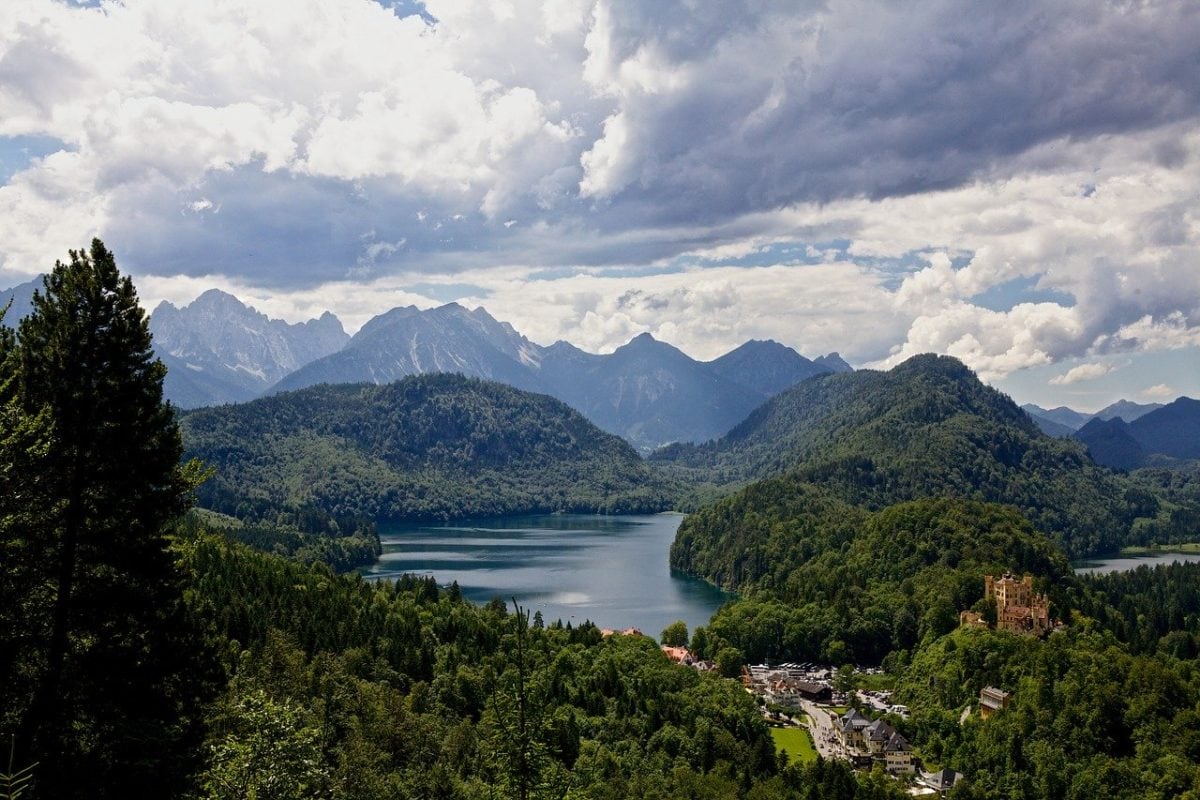
Not only is there a tremendous amount to do, see, eat, and experience in Germany, you can easily combine a visit to Germany with other European destinations. Germany is easy to get around in by train, bus, car or bike, and many people speak English.
You’re probably wondering…where do I even begin with planning my dream-come-true vacation to beautiful Deutschland?
Where should I go? Is it better to take the train or rent a car? What are the must-see cities and attractions? Which ones should I skip? Where’s the best place to stay? What should I eat and drink?
Don’t worry! We’re here to help you narrow down your travel options, plan your itinerary, and book your trip with ease.
This guide will get you started but it just scratches the surface of what you need to know to plan an epic trip.
If you’re towards the beginning of your trip planning, you’ll find our popular Germany Travel Planner super helpful. Especially if you’ll be visiting Germany for the first time…or haven’t ever planned an international trip like this before.
If you’d like one-on-one help creating an epic itinerary, finding the perfect accommodations, sorting out transportation and tickets, zeroing in on the best sights, castles, tours and private guides, and all of the other little details that can make or break your trip, book a one-on-one consult with Cate, an itinerary review or have us create a completely custom itinerary for you!
Contents
- 1 Meet Your Germany Travel Guides
- 2 Overview of Regions
- 3 Where to Go in Germany: Itineraries and Planning
- 4 Passports & Visas
- 5 What’s the Best Time to Go to Germany?
- 6 Germany Booking Timeline
- 7 What’s the Weather in Germany Like?
- 8 What Time is it in Germany Right Now?
- 9 What’s the Best Way to Get to Germany?
- 10 Where to Stay in Germany
- 11 Getting Around Germany
- 12 What to Wear in Germany
- 13 What to Eat in Germany
Meet Your Germany Travel Guides
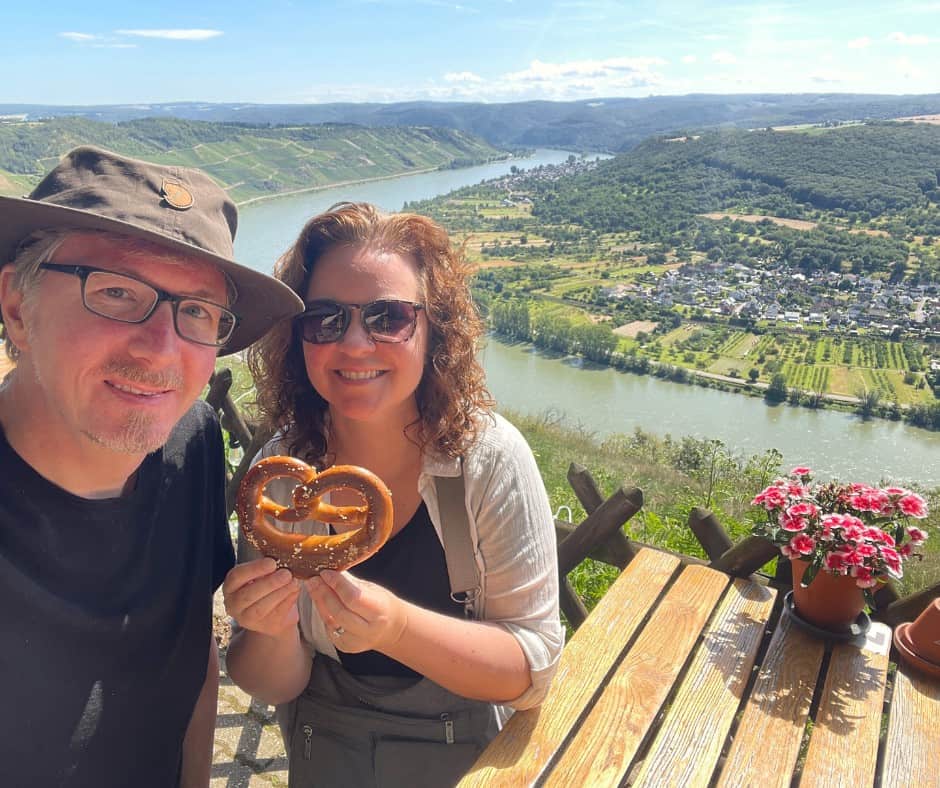
Hi, we’re Cate and Aaron, digital nomads who divide our time between Europe and our home in North Carolina.
We love helping people plan amazing trips to Germany. I (Cate) used to live there and have spent nearly 35 years of my life going back and forth between the US and Germany. Aaron and I and have traveled to all corners of the country multiple times.
We know Germany inside and out!
And we’re so excited to help you plan your dream trip to Deutschland. Let’s get started!
Overview of Regions
Northern Germany
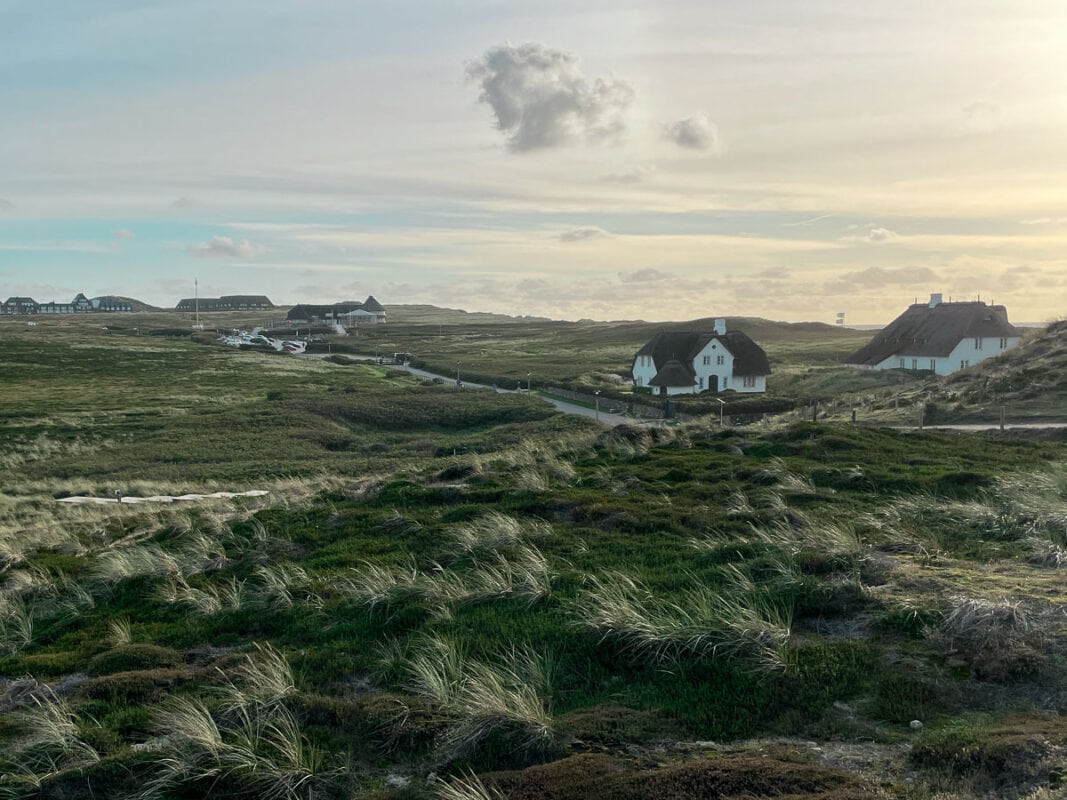
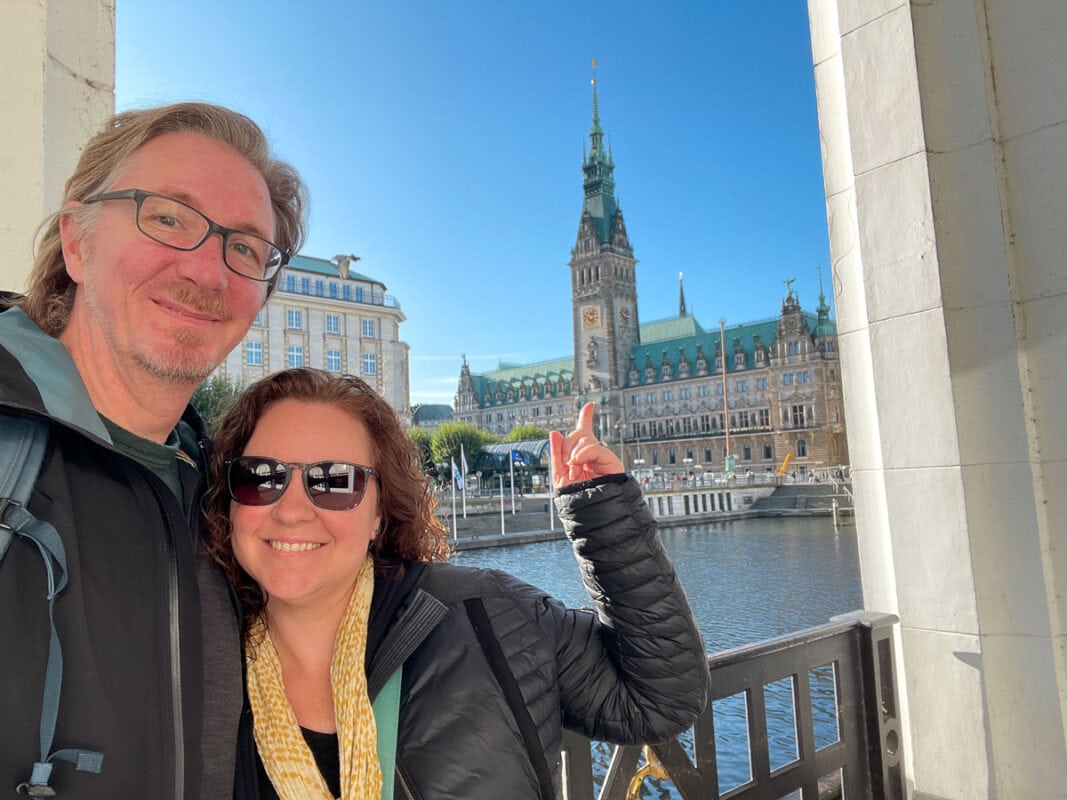
Hamburg is the largest city in this region but there are other must-visit smaller cities like Lübeck, Stade, Bremen, and Lüneburg. Northern Germany also has the beautiful beaches of the North Sea and the Baltic Sea, the Wadden Sea national park, and the islands of Sylt, Flör, and Heligoland. Northern Germany is flat and great for biking. It looks so different from Bavaria! Combine a trip to Denmark with a visit to northern Germany.
Eastern Germany
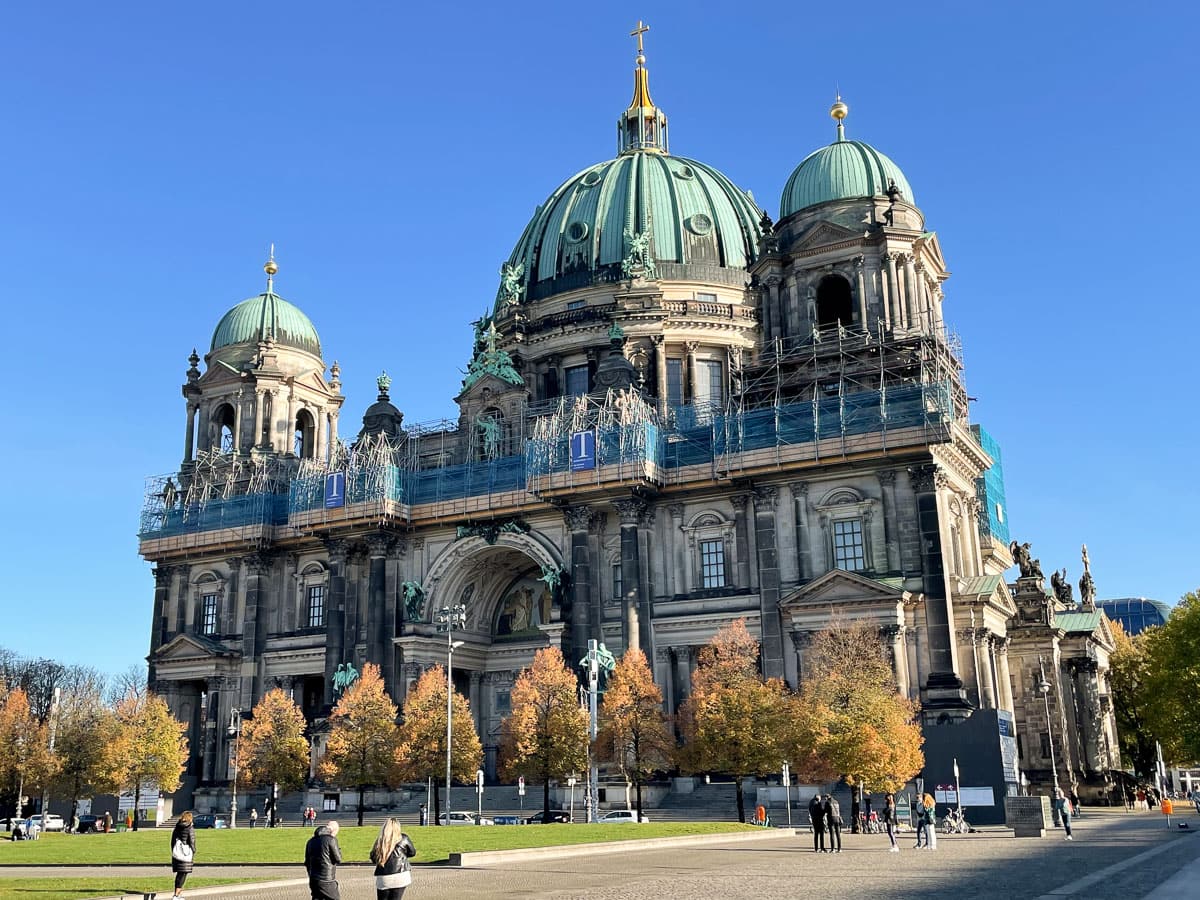

Berlin is of course the feature city in this region, but Dresden, Leipzig, Magdeburg, Quedlinburg, Bautzen, Erfurt, and Weimar are smaller must-see cities. There’s also the Harz mountains, Saxon Switzerland, Saalfeld Fairy Grottoes in Thuringia, Wernigerode castle, the Schwerin Palace, and Sansouci in Potsdam. Combine a trip to eastern Germany with a visit to Poland or the Czech Republic.
Central Germany


This region offers bustling cities like Cologne, Düsseldorf, and Frankfurt, smaller cities like Aachen, Wiesbaden, Koblenz, and plenty of cute villages. There’s also the Rhine and Mosel river areas, vineyards, the Eifel national park, castles, and beautiful rolling hills. Combine a visit to central Germany with a trip to the Netherlands, Belgium, Luxembourg, or France.
Black Forest
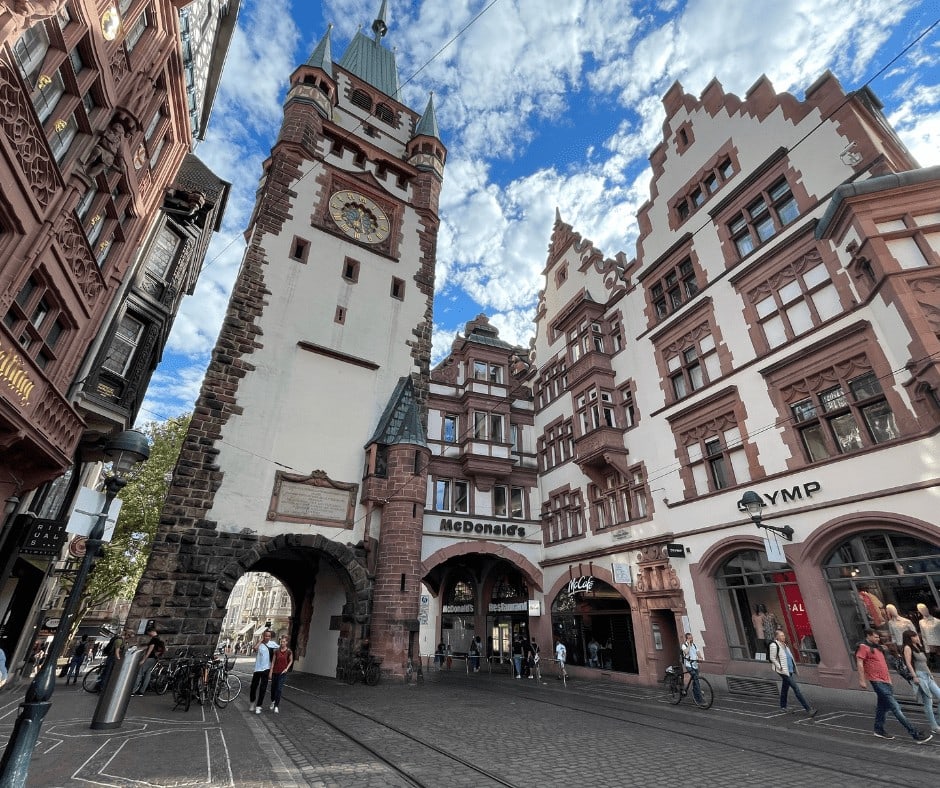
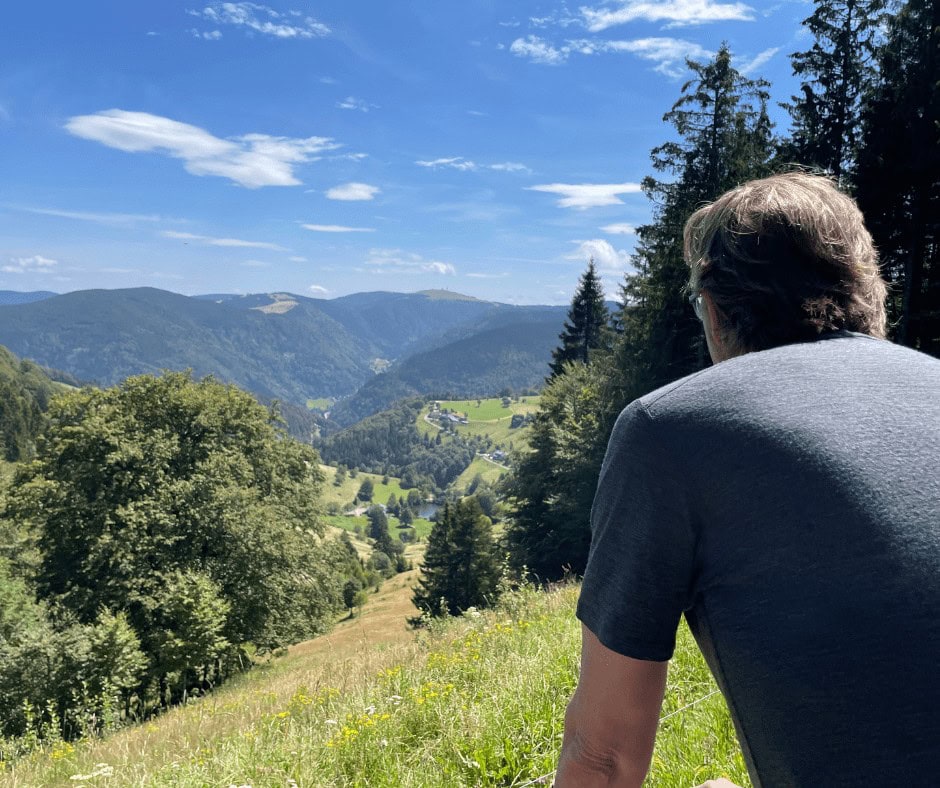
Stuttgart is the largest city in this region, and smaller cities like Baden-Baden, Heidelberg, Freiburg, Tübingen, and Ulm also warrant a visit. Vineyards and wineries, spa towns, castles (such as Hohenzollern or Lichtenstein), waterfalls, Lake Constance, cute villages, and hiking are also features of the Black Forest/Baden-Württemberg region. Combine a trip to France or Switzerland with a visit to southwestern Germany.
Bavaria & German Alps
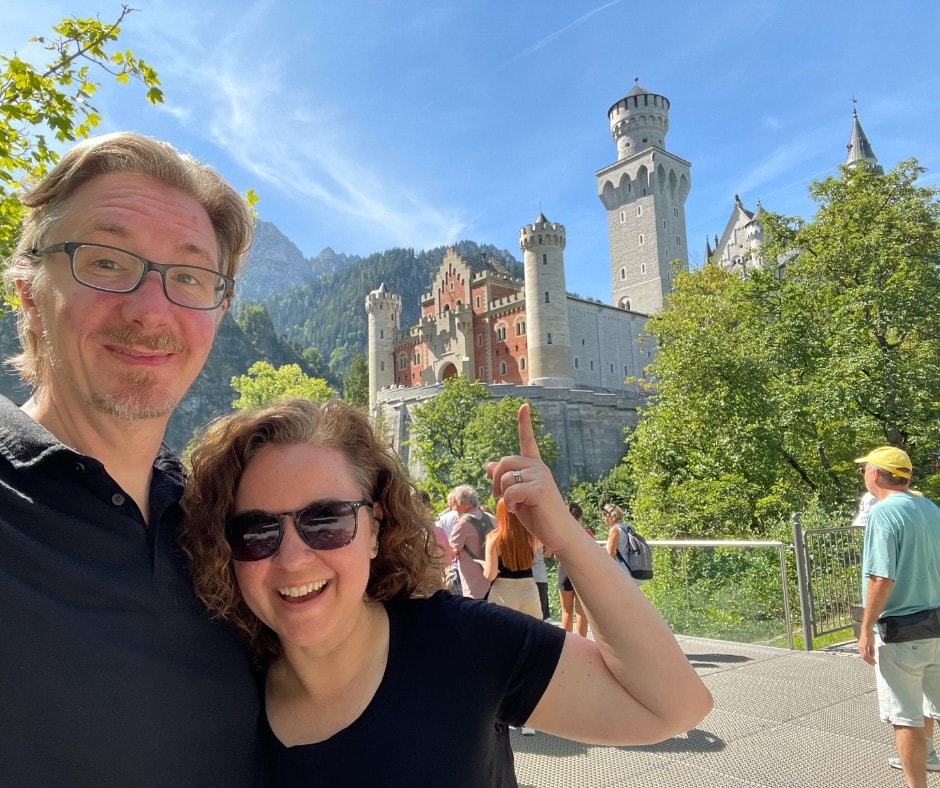
Munich is the feature city of Bavaria (Oktoberfest!), along with smaller cities like Regensburg, Nuremberg, Würtzburg, Bamberg, Passau, and of course Rothenburg ob der Tauber. There’s also the famous Zugspitze, Eagle’s Nest, Neuschwanstein castle, and Chiemsee lake, as well as lovely alpine towns like Garmisch-Partenkirchen, Oberammergau, and Berchtesgaden. Combine a trip to Bavaria with a visit to Austria, Czechia or Switzerland.
Not Sure Where You Want to Go in Germany?
There are SO many amazing places in Germany and surrounding areas, it can be super hard to narrow things down.
If you have our Germany Travel Planner, start your planning by watching the video where I give a tour of the various regions of Germany and what you can do and see in each one. That will help you being to narrow things down.
Then look at the regional planning guides so you can zero in on the regions you’re most interested in.
Finally, spend some time exploring our interactive planning map so you can see top recommended sights, hotels, castles, castle hotels, day trips, etc. along with our insider info, tips, and photos!
Where to Go in Germany: Itineraries and Planning
There’s so much to see and do in Germany! Here’s some info to get you started on your itinerary.
If you have just a few days, I recommend focusing on one city and a day trip (e.g., Hamburg with a day trip to Lübeck or Munich with a day trip to Neuschwanstein).
If you have a week, you could visit 2 cities (plus 2 day trips) in different parts of Germany and allot one day for travel between cities (e.g., a few days in Munich with a day trip to Chiemsee, travel day to Berlin, then a few days in Berlin with a day trip to Potsdam). Or you could spend a week touring one region of Germany (e.g. the Black Forest or the Rhine and Mosel areas).
If you have two weeks, you can see a lot of Germany! You could, for example, start in Berlin, then visit Hamburg, take a day trip to Lübeck, then visit the Rhein river area, stop in the Black Forest, and end your trip in Munich. You could easily do this trip via train or car. Take a look at a couple 10-14 day itineraries we’ve outlined to give you a sense of how much you can do in that amount of time.
If planning your itinerary feels overwhelming, we can help! If you could use a personalized day-by-day trip plan with hotels, train or driving routes, and other tailored recommendations, check out our custom itinerary service. I also do one-on-one trip planning consults in Zoom.
We’re here to make your Germany trip smooth and stress-free. Let us help you create an itinerary that’s tailored to your travel style and interests!
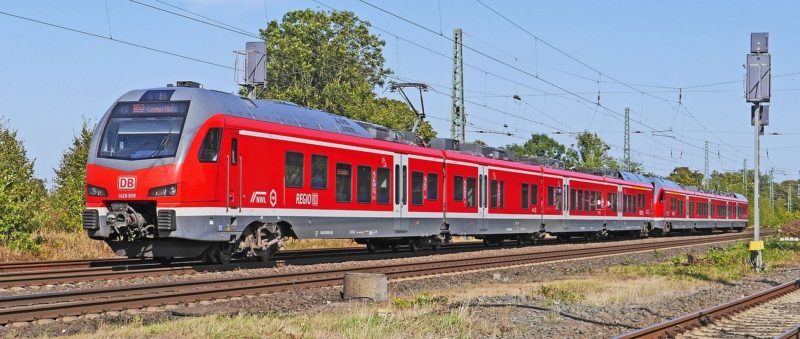
How long does it take to travel around Germany by train?
It’s quick and easy to travel around Germany by train. Yes, there are delays and some cancelations. But in our experience traveling all over Germany by train over the past few years, most of time things have gone according to plan. Here are some sample travel times to give you an idea:
- Berlin to Hamburg – 1 hour 45 minutes
- Berlin to Munich – 4 – 4 1/2 hours
- Hamburg to Lübeck – 1 hour
- Hamburg to Cologne – 4 hours
- Hamburg to Munich – 5 hours 40 minutes
- Frankfurt to Nuremberg – 2 hours
- Stuttgart to Munich – 2 1/4 hours
- Munich to Berchtesgaden – 2 hours
I use and recommend the official German rail system website to check travel times and book train tickets (point-to-point, saver tickets, and discounted regional tickets). I book all of our train tickets here.
Tip: book a seat reservation on high speed ICE/IC/EC trains!
A lot of our clients tell us that they want to travel by train but are nervous about it because there’s so much they don’t know about how to get the right tickets, how to find train routes and times, how to navigate train stations, and more. That’s why we include a whole Germany Train Travel Made Easy section in our Germany Travel Planner. Since we get so many questions, we also offer the Germany Train Travel Made Easy as a stand-alone guide.
Want more itinerary ideas? Are you a big city person? Check out…
Prefer smaller historic, picturesque cities? Check out…
- Bamberg
- Bremen
- Bonn
- Dresden
- Freiburg
- Lübeck
- Heidelberg
- Regensburg
- Tübingen
- Würtzburg
What about cute little villages with “Fachwerk” (half-timber) architecture? There are so many! Here are a few ideas…
- Bacherach
- Berchtesgaden
- Cochem
- Dinkelsbühl
- Esslingen
- Goslar
- Meissen
- Rothenburg Ob der Tauber
- Stade
- Quedlinburg
- Wernigerode
Looking forward to visiting fairytale castles?
- Neuschwanstein (the “Disney castle”) & Hohenschwangau
- Castles near Frankfurt
- Castles near Cologne
- 16 castles to visit in Germany
- Castle Hotels
Like islands and water? Take a look at…
- Sylt
- Föhr
- Husum (North Sea)
- Timmendorferstrand (Baltic Sea)
- Heligoland
- Rügen
- Lake Constance (Bodensee)
- Chiemsee
- Titisee
What about nature, hiking, and national parks? Consider…
- Schleswig-Holstein Wadden Sea National Park
- Hamburg Wadden Sea National Park
- Lower Saxon Wadden Sea National Park
- Jasmund National Park
- Western Pomerania Lagoon Area National Park
- Müritz National Park
- Lower Oder Valley National Park
- Harz National Park
- Kellerwald-Edersee National Park
- Hainich National Park
- Eifel National Park
- Hunsrück-Hochwald National Park
- Saxon Switzerland National Park
- Bavarian Forest National Park
- Berchtesgaden National Park
- Black Forest National Park
How about a road trip? Why not drive the…
- German Timber-frame Road (northern to southern Germany)
- Romantic Road (Bavaria and Baden-Württemberg, north/south)
- Castle Road (Bavaria to Baden-Württemberg, east/west)
- Wine Road (Palatinate wine region, north/south)
- Fairytale Route (from Hanau to Bremen, south/north)
- Black Forest High Road (Baden-Württemberg, north/south)
- Alpine Route (Baden-Württemberg to Bavaria, east/west)
- Volcanic Route (Rhein River and Eifel mountains, north/south)
Passports & Visas
If you’re from the US, Canada, Australia, New Zealand and many other countries, you do not need a visa to enter Germany (at the time of publishing this article). You do, however, need a valid passport with at least 3 months validity AFTER your planned departure date.
Play it safe and have MORE than 6 months validity on entrance to Germany! You also need at least 2 blank passport pages at the time of your arrival. Check your passport NOW so you have plenty of time to renew it if needed. Do not wait until the last minute to do this (been there, done that – it’s expensive and stressful)!
Germany is part of the Schengen zone, which means you can stay in Germany for up to 90 days without a visa. If you visit other countries in the Schengen zone before or after Germany, that counts towards your 90 days and reduces the amount of time you can spend in Germany. While on the automatic 90-day tourist visa you may not work but you can engage in business.
What’s the Best Time to Go to Germany?
The best time to visit Germany is whenever you can get there! No, seriously! There’s no best time of year for your Deutschland tour because there’s no bad time of year to visit. I’ve traveled all over Germany in spring, summer, fall, and winter and enjoyed every single season (Cate here, writing this article, by the way).
When should you travel to Germany? Well, it just depends on what you’re looking for…
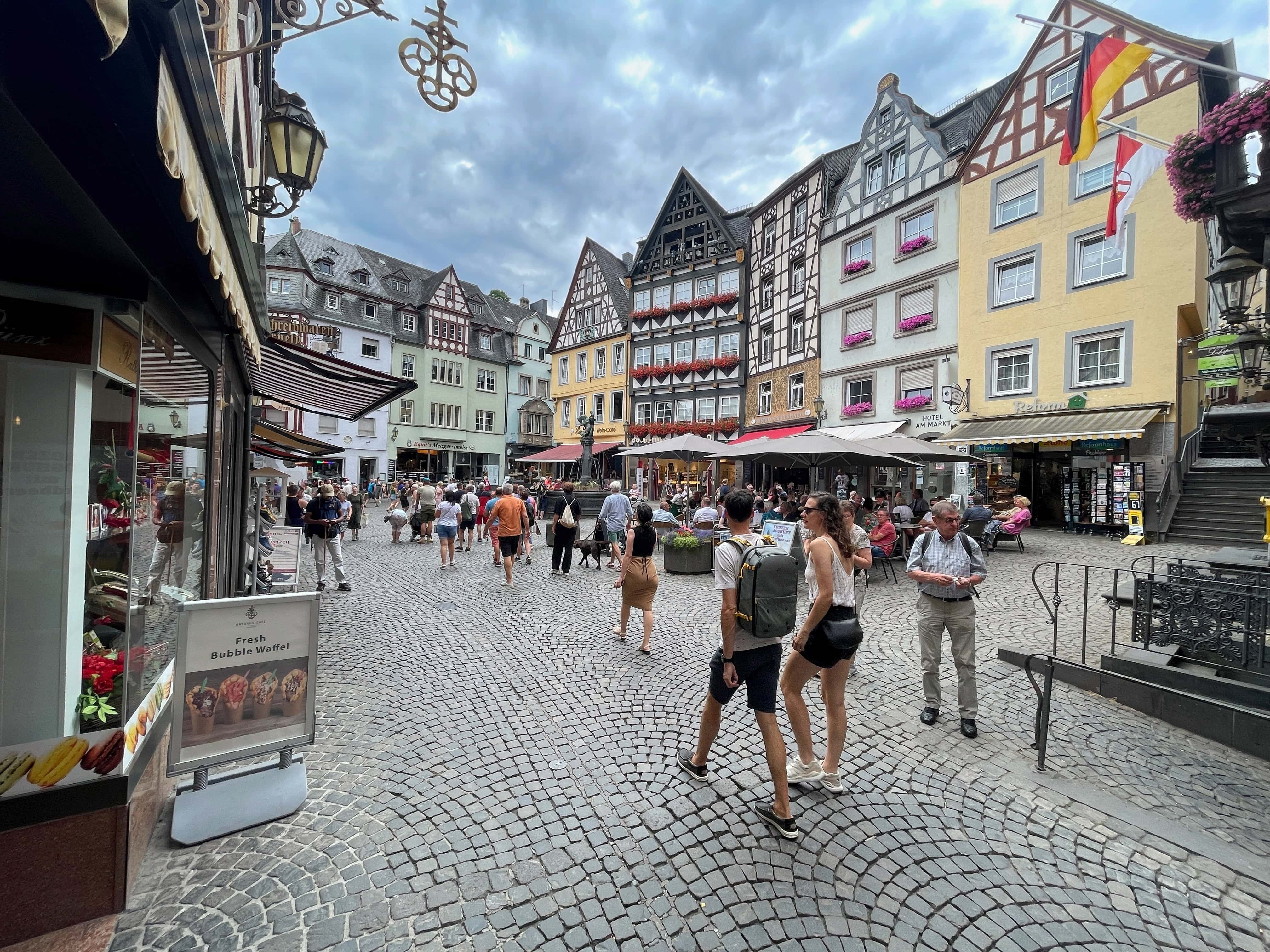
Summer is when you’re most likely to have warm (even hot) sunny weather. But it’s not guaranteed. I’ve had hot steamy summers in Germany (like last summer when we traveled during a heat wave), cold rainy summers, and everything in-between.
Fortunately, even if you encounter rain in the summer it likely won’t last more than a few hours or at most a couple days before you’ll see the sun again. The benefit of summer travel is that you’ll have nice long days for sight-seeing because the sun doesn’t fully set until about 10pm. If you’re interested in beaches or mountains, summer is a great time of year to visit.
Note, however, that not all hotels, cars, and restaurants use A/C. If you really hate hot weather, play it safe and avoid Germany in the middle of the summer. (Although, to be honest, in all of the summers I’ve spent in Germany, there have only been a few days in the summer that I’ve found truly unbearable without A/C.) If you must have A/C, be sure to confirm that your room or rental car has it.
Summer can also be a more crowded time to travel, since so many families make use of summer break. Book accommodation early for the most options and best prices!
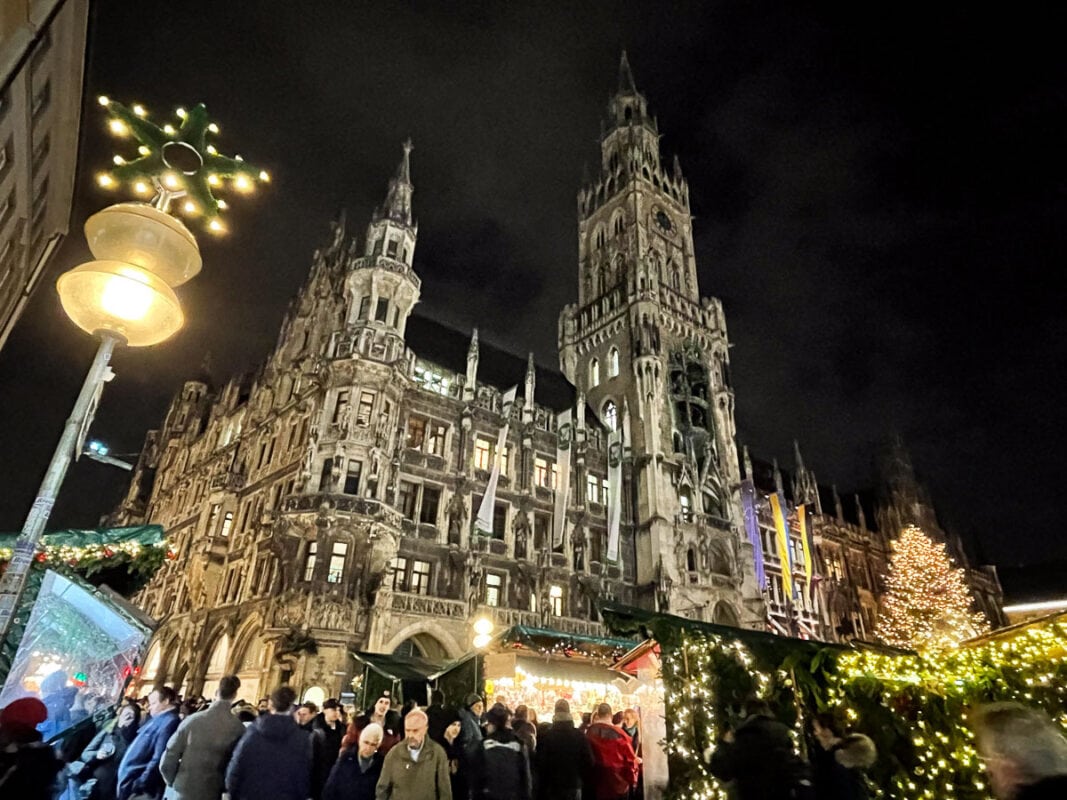
Winter travel in Germany can be cold but beautiful. One of my favorite times of year to travel in Germany is during the four weeks of advent at Christmas.
Yes, it gets dark early (by 5pm or a bit earlier) but the lights, decorations, and Christmas markets more than make up for it. Plus, you can go skiing and enjoy other winter activities.
I was just in Germany for a couple weeks in December and the weather was perfectly fine 90% of the time. There was only one day where the weather was truly miserable and even on that day there were enough breaks in the weather to enjoy my day trip exploring a new town and a new Christmas market.
Germans don’t let winter keep them from enjoying outdoor activities, hiking to strolling through a Christmas market or enjoying a coffee at an outdoor cafe. Don’t let it stop you, either! Just bundle up, grab a mug of Glühwein, and you’ll be fine!

Fall and spring are also great times to visit Germany. In the fall you’ll enjoy crisp mornings and cool evenings and seeing the leaves change color.
In the spring you’ll experience the joy everyone feels when they can once again sit outside at cafes and restaurants. The weather can vary quite a bit day to day but if you travel late in the fall or early in the spring you can score great deals and will find smaller crowds.
Germany Booking Timeline
Our biggest tip is to start planning your trip as early as you can. Especially if you…
- Are traveling during peak times like summer
- Have very specific travel dates
- Have unique lodging, transportation, sight-seeing needs
- Want to save money
- Are traveling with multiple people
- Are visiting during a special event, such as Oktoberfest, Christmas market season, Berlin marathon, etc.
Here’s a general booking timeline to get you started:
6-12+ months in advance:
- Research and book your international flights
- Research travel insurance
- Plan your travel itinerary and dates
- Research and book flights
- Research travel options within Germany (rental car, train, bus, etc)
- Research accommodation options (book if you find great deals or if availability is limited)
- Research and connect with private guides
- Make sure your passport is up to date (you need at least 6 months left on it when you enter Germany) and apply for a new one if it isn’t
3 – 6+ months in advance:
- Book accommodation
- Book trains or busses (the best deals go quickly!)
- Book rental car
- Book tours, events, and tickets
- Review your travel wardrobe and gear and purchase the items you need
- Purchase things like an outlet adapter, phone tether, portable battery, etc.
1 month in advance:
- Book any remaining attractions and tours
- Book travel insurance
- Book airport transfers or plan how you will get to your lodging
- Consider a Germany driving tutorial if you’re renting a car
- Purchase a sim card for phone or check how you can use your current phone service in Germany
1+ weeks in advance:
- Subscribe to the Deutschland-Ticket (if using)
- Print out or ensure that you can easily access all bookings, tickets, and travel info on your phone (make sure you can access everything without data or wifi!)
- Pack!
What’s the Weather in Germany Like?
What will the weather be like when you visit Germany? Well, it depends on the time of year and where you are. Weather in Germany can be somewhat unpredictable no matter the time of year.
I recommend being prepared by wearing layers, packing an umbrella or rain jacket, and remembering that the weather will likely change soon. And, as I said earlier, don’t let any kind of weather stop you from enjoying Germany!
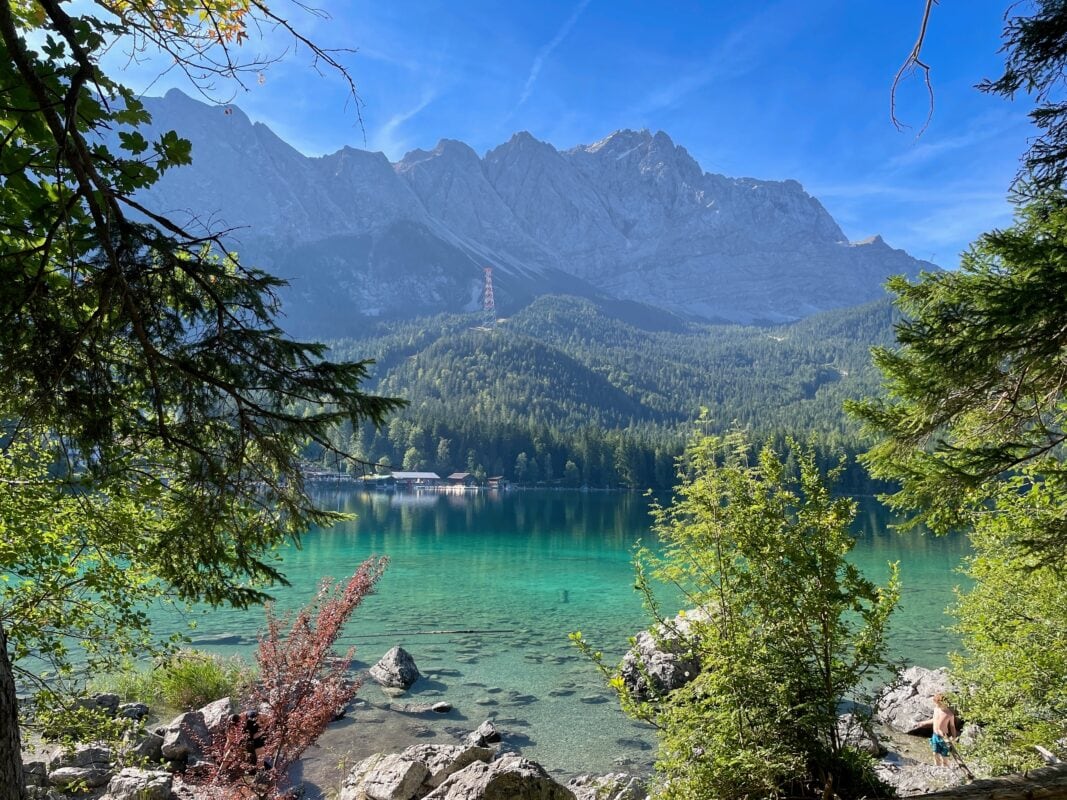
Summer. Germany comes alive in the summer with everyone and their dog (literally, there are dogs everywhere) outside enjoying the nice weather. Average high in the summer is 80F.
Be warned…it can rain in the summer but it doesn’t usually last that long. It can also be super hot in the summer…but again, scorching temperatures doesn’t usually last that long.
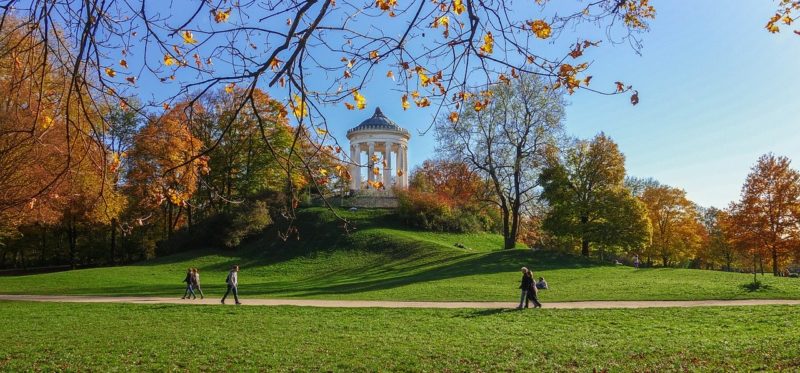
Fall. Such a beautiful time of year in Germany with the leaves changing colors and cool, crips mornings and evenings and warm days. One of my favorite times of year in Germany! In September, the average high is 67F and by November it’s around 47F.
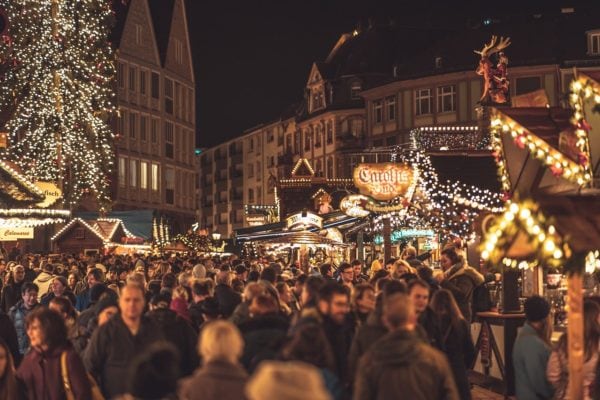
Winter. Bring your scarf, hat, and mittens because German winters can get cold! Temps can hover around freezing with some warmer days in the 40s/50s F. While it can snow anywhere in Germany, you’ll find the most snow in southern Germany. Winter weather doesn’t mean everyone hides inside, though. On the contrary! Do what the Germans do – bundle up and enjoy the outdoors.

Spring. I love being in Germany on the first spring day because everyone heads outside to enjoy the sun and everyone is in such a good mood! Early spring will see a high around 47F but by late spring it’s more like 67F.
What Time is it in Germany Right Now?
Germany is in the Central European Time zone (CET) or UTC+2. It’s 6 hours ahead of the US EST, 7 hours ahead of CST, 8 hours ahead of MST, and 9 hours ahead of PST.
Daylight savings in Germany: time “falls back” in late October and “springs forward” in late March.
What’s the Best Way to Get to Germany?
It depends on where you’re coming from and where you’re going. When flying from outside Europe, many people fly into Frankfurt (FRA), the largest airport in Germany and one of the largest and busiest airports in Europe.
The benefit of flying into Frankfurt is that it has a ton of direct flights, and once you reach Germany you can easily take a commuter flight, train, bus or rental car to your final destination.
The downside? The airport is huge, busy, and I’ve noticed prices into Frankfurt are sometimes higher than regional airports in Germany.
I used to always fly into Frankfurt, and then take a train, bus or rental car to my final destination. But recently? I’ve found that it’s easier (and sometimes cheaper) to bypass FRA and fly into other German cities, such as Munich, Hamburg, Berlin, Düsseldorf (Cologne) or Stuttgart.
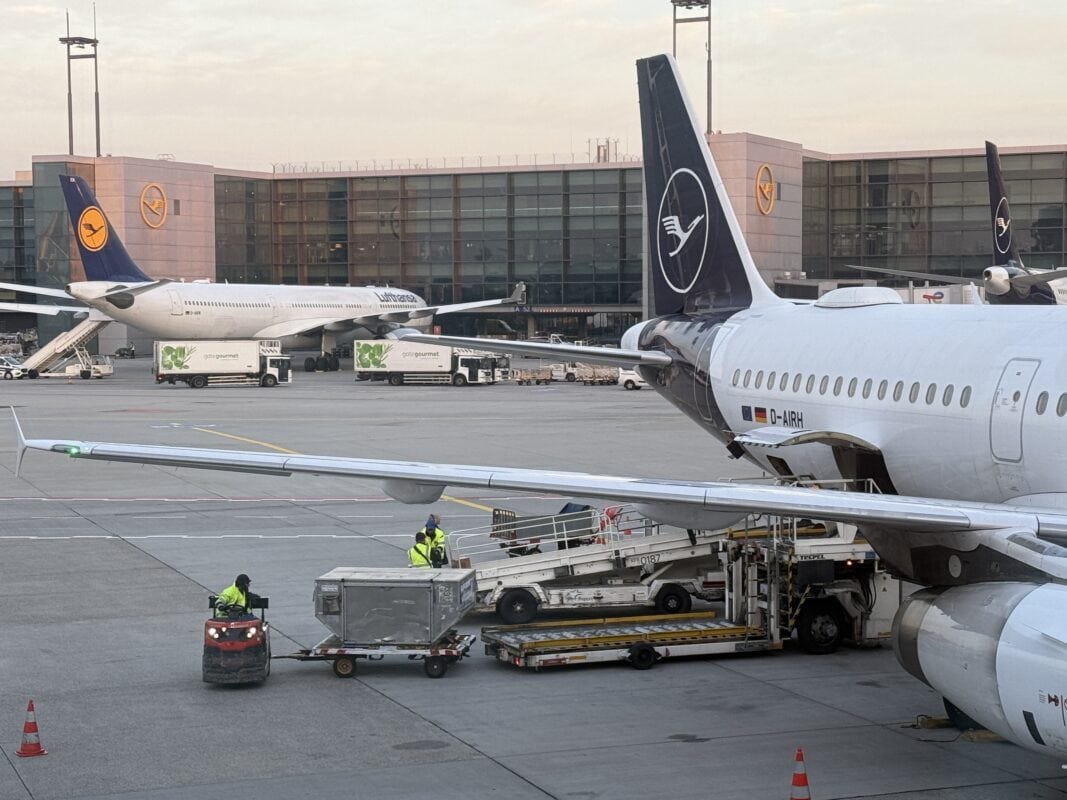
A Few Notes About Flying Into FRA (Frankfurt Airport) and Traveling Onwards
If you take a commuter flight from Frankfurt (FRA) to your final destination in Germany, you’ll go through passport control in FRA and then go to your connecting gate. Super easy. Most flights from FRA to elsewhere in Germany are an hour or less in duration.
If you’re traveling onward by train from Frankfurt, you can transfer to the train right at the airport below Terminal 1. If your train leaves from the main station in Frankfurt, you can either take the S-bahn or a regional train from the airport to the Hauptbahnhof (main station) .
Important: you’ll find cheap “savings fare” train ticket prices if you book your ticket online well ahead of your arrival. Be sure to book your ticket for at least a few hours after your flight’s arrival time into FRA.
Tip: If you want maximum flexibility and peace of mind, buy a “flex ticket.” You’ll pay more but these tickets aren’t tied to a specific train. So if your flight is five hours late, you can take a train later in the day without changing your ticket or losing money.
These tickets also you to stop somewhere en route to your final destination for a couple hours, and then get back on a different train (e.g., stop in Stuttgart for a couple hours on your way to Munich). So if you arrive on time, you can work in a short excursion on the way to your final destination (store your luggage at a locker in the train station). If your flight is late, just go directly to your destination. These tickets are also refundable before the first day of travel.
For ultimate flexibility and peace of mind, spend the night in or around Frankfurt and book a saver fare train for early the next morning.
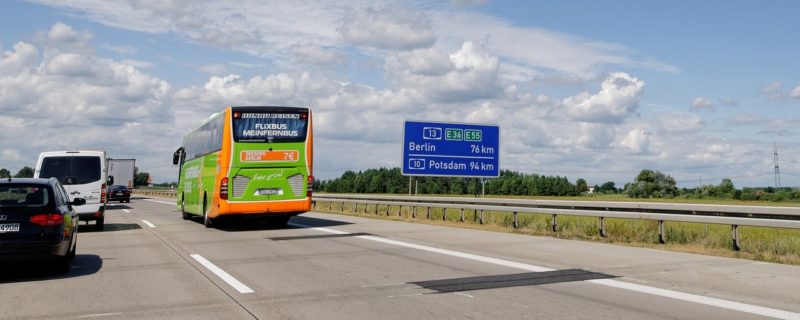
You can also easily pick up a rental car at FRA and drive to your final destination. Aaron and I have done this a few times and never had any problems.
The one problem we do have? Staying awake long enough to drive to our destination! We usually keep the driving distance to an hour or two on the day of our arrival and drink a lot of coffee. Sometimes we pull over at rest area and take a nap.
If you want to rent a car at the airport and are concerned about driving while jet lagged, consider picking up the car and then spending the night in nearby town, such as Wiesbaden or Heidelberg.
If you’re catching a bus from Frankfurt city center to travel onwards, S-bahn 8 or 9 will zip you into town quickly and cheaply in about 10-15 minutes. Buy tickets at any of the ticket machines before you board the S-bahn.
You can also catch busses into Frankfurt and elsewhere in front of Terminal 1 (arrivals level) and Terminal 2 (level 2).
You’ll find taxis in the same general area. It takes about 20 minutes to get into downtown Frankfurt by taxi.
Flying to Germany from Elsewhere in Europe
These days it’s super easy and generally inexpensive to fly to Germany from all over Europe. Here are a couple tips:
When booking your international flight, you might be able to include a stop-over in the city where you’ll transfer to your Germany flight. I used to do stopovers in London, and a couple years ago I did an awesome stopover in Iceland. TAP also offers free stopovers in Lisbon or Porto.
I highly recommend looking into both flying and taking a train (or bus) into Germany, especially if you’re arriving from a neighboring country and not on a stopover. Of course, if you’re flying from cities like London, Barcelona, Rome or Oslo, flying is the best and often cheapest option.
But if you’re traveling from Paris, Vienna, Copenhagen or Prague, for example, a train is often the better way to go. Even if a flight is only an hour, you have to factor in the time it takes to travel to the airport, go through security, potential flight delays, and then traveling to your lodging once you land. A 5- or 6-hour train ride might actually take less time than a 1-hour flight when you total it all up!
Traveling to Germany By Train, Bus or Car
Traveling to Germany from other European countries by train, bus or car is easy. Train travel is generally simple, comfortable, and quick. Most train stations in Germany are located in the city center, so it’s easy to get to your lodging via taxi or public transportation.
If renting a car in another country, just double check that you’re authorized to take the car out of the rental country. If you are, you’ll have no problems crossing the boarder and driving around Germany.
Busses tend to cost less than trains, and you can find some amazing deals, but to be honest, I still prefer taking trains over busses. Trains are more comfortable, you can get up and walk around, and they’re almost always faster than busses. Plus, they don’t get stuck in traffic.
Tips for Booking the Best Flights with Cash or Miles:
- Start looking for flights early, especially if you’re traveling during peak season.
- Track flights through google so you’ll know a good deal when you see one.
- Look for last-minute deals. When I decided to go to Germany once in December, I didn’t start looking for flights until early November (the trip was a last-minute decision). Because I was flexible on travel dates and went early in the month, I found excellent tickets using miles. This doesn’t always happen, but it never hurts to look for deals, even if your travel dates are right around the corner.
- Fly in or out of regional airports (e.g., Berlin, Hamburg, Stuttgart, Munich, Düsseldorf). When I booked our flights for a mid-June trip, I couldn’t find anything into Frankfurt using miles. But I did find flights into Berlin and out of Stuttgart, and that actually worked even better for that trip. For a December trip, I found that flying in and out of Stuttgart used the lowest amount of miles and had the best schedule. We’ve also flown in and out of Hamburg, Berlin, and Munich.

Where to Stay in Germany
Germany has so many options for lodging:
- Vacation rentals (e.g., VBRO, Airbnb)
- Hip boutique hotels
- Quirky hostels
- Traditional HI hostels
- Large European or German hotel chains
- American-styles hotels (Hilton, Marriott, etc)
- Family-run Pensionen (bed and breakfast)
- Camping (RV and tent)
To help you start your accommodations search, check out our Germany hotel guides here.
Breakfast is typically available for an extra fee. Sometimes breakfast will feature fresh bread or Brötchen (delicious German rolls), cold cuts and cheese, butter and jam, and tea and coffee. Other times there will be an extensive breakfast buffet that includes things like yogurt, museli, a variety of breads, meats, cheeses, and even hard-boiled eggs. You’re unlikely to find things like omelets, bacon, pancakes, waffles, and hot oatmeal.
Hostels can be a great option for families, as many offer family rooms. Hostels typically offer a simple breakfast and sometimes dinner. While accommodations are simple, some hostels can be in spectacular locations. The hostel in Bacharach, for example, is in an old castle on a hill and offers a gorgeous view of the town below and the Rhine river! They can fill up quickly, though, so book early.
Getting Around Germany
One of the benefits of traveling in Germany is that it’s super easy to get around the entire country. You have so many transportation options.
You can rent a car and drive from place to place. Or you can stick to trains and busses. Or ride a bike – there are tons of bike paths throughout Germany.
If I’m primarily visiting big cities I prefer taking the train or a bus to get from one city to another. When I spend more time in smaller cities or want to take day trips to harder to reach places, I prefer having a car.

Speaking of city public transportation, Germany’s is one of the best! It’s super easy to get everywhere you want to go via the S-bahn (above ground metro), U-bahn (underground metro), Strassenbahn (street car), and city bus. Taxis (and Uber, where available) are also convenient options, though more expensive than public transport.
German cities are very walkable, so it’s easy to get around by foot. And, if you’d like to bike around like a local, there are lots of places to rent bikes (or scooters!) around town or maybe even at your hotel or Airbnb. If you’re more interested in just one afternoon of biking, try a city bike tour!
A few transportation tips:
- Use our Germany Train Travel Made Easy Guide to understand and then use the Germain rail system skillfully.
- For the best train ticket prices book your ticket via the official German rail system website in well in advance. I book all of our tickets there.
- If you don’t mind taking slower regional trains, you can get some really cheap tickets and regional day tickets. You may not want to use these tickets to go from Munich to Hamburg, but they’re great for day trips, whether traveling solo or with others.
- The Deutschland-Ticket is a great option if you’re planning to use city public transit and travel on some regional trains.
- Busses are often less expensive than the train (though not quite as comfortable and often slower).
- There are Eurail options for Germany, and they’re a great choice if you value flexibility and ease or if you want to make stops while traveling (eg., stop in Cologne for a couple hours while traveling from Hamburg to Munich).
What to Wear in Germany
Check out our packing list for Germany and the 15 things we always bring with us to Germany.
Layer, layer, layer! The weather in Germany is often unpredictable so your best bet is to bring layers so you can customize your wardrobe on the fly. Since rain is a possibility any time of year, you may want to bring a light rain jacket or an umbrella.
Bring comfortable shoes. You’ll no doubt walk all day long (often on cobblestone), so bring your most comfortable, supportive shoes. Be sure to break in your shoes before you travel. There’s nothing worse than realizing a day into your trip that your shoes pinch your toes or give you huge blisters.
You can wear jeans. Some people say never travel with jeans but I’m not one of those people. I love traveling with jeans! They’re comfortable, I can wear them a few times without having to wash them, and I feel less like a tourist wearing them because everyone wears them. If you like jeans, wear jeans. Everyone in Germany wears jeans.
Scarf, hat, gloves. If you’re traveling in the winter or even late fall or early spring, definitely bring a warm scarf, hat, and gloves or mittens. Or buy them in Germany and take them home as a souvenir! Almost all of my winter accessories are from Germany.
You can wear shorts in the summer. Shorts are more popular in Germany than they used to be, so if you like them and are comfortable in them, wear them. That said, do also bring summer dresses or skirts and or lightweight pants to wear when shorts are too informal.
Bring a comfortable day bag or purse. When you’re out and about all day you want a comfortable bag or purse to hold your travel essentials – wallet, phone, camera, ipad/kindle/book, umbrella, journal, etc. I’ve been using this day bag for the past couple of years – it’s so comfortable to wear and the pockets keep me organized.
What to Eat in Germany
You’ll never go hungry while traveling in Germany! While you can always find traditional items like Schnitzel, Spätzle, Rouladen, and Bratwurst, there are plenty of healthier options, including those that are vegetarian, vegan, and gluten-free.
Many restaurants now cater to special diets and accommodate allergies, as do some specialty grocery stores. Aaron has a meat allergy and frequently eats gluten-free and has never had a problem finding delicious food in Germany.
These days Germany has a wide variety of restaurants to ft all budgets featuring cuisine from all over the world (except Mexican…I’ve yet to find good tacos in Germany). So you won’t be stuck eating Schnitzel every day – unless you want to!
We usually eat breakfast at our Airbnb or hotel, enjoy a nice lunch at a restaurant we’ve stumbled upon, and then grab a Döner, salad, pizza or some simple grocery store snacks for dinner. We also often picnic using ingredients from the bakery and grocery store or farmer’s market.
Traditional German dishes to try: Schnitzel, Spätzle, Rouladen, Bratwurst, Sauerbraten, Schweinehaxen, Maultaschen, Currywurst, Leberkäse, Flammkuchen, Sauerkruat, Kartoffelsalat (potato salad), Quark, all kinds of German breads.
Quick lunches and snacks on the go: Döner, Falafel, Bratkartoffeln (fried potatoes), Kartoffelpuffer (potato pancakes), Bratwurst, Currywurst, salads, Brötchen filled with meat and/or cheese, fresh pretzels, pastries, cakes. Click here to see the best German street food!
Desserts & sweet treats: Schwarzwälderkirchtorte (Black Forest Cake), Bienenstich (Bee Sting Cake), cheesecake, Stollen, Frankfurter Kranz, cake, Donauwellen cake, Berliner, Lebkuchen, Pflaumenkuchen (plum cake), all kinds of pastries and chocolate – just to name a few! Click here to see some must-try German desserts and sweets.
Beer: every kind you could ever imagine! I usually just ask for the local beer unless there’s a specific one I know I want to try. Click here to see what kind of beer to try in Germany.
Christmas: This is the best time of year to be in Germany, partly because of the many delicious holiday treats like Lebkuchen, Stollen, Glühwein, and so much more. Click here to read more about what to eat in Germany during the Christmas season.
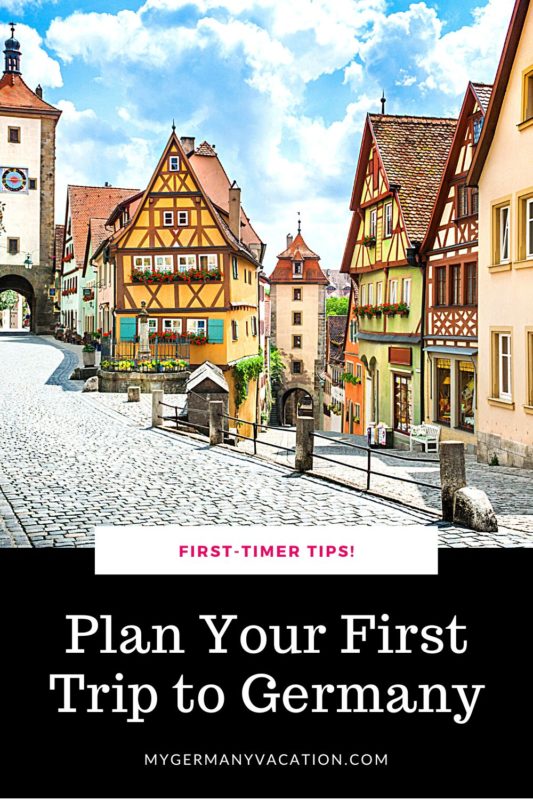


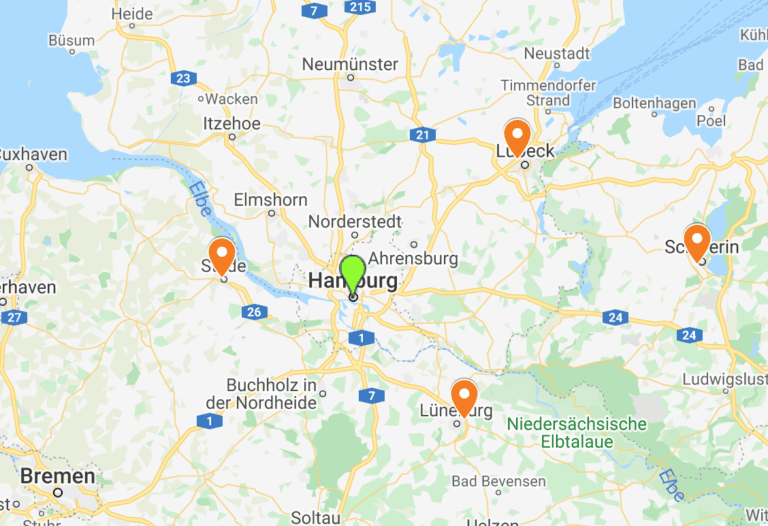



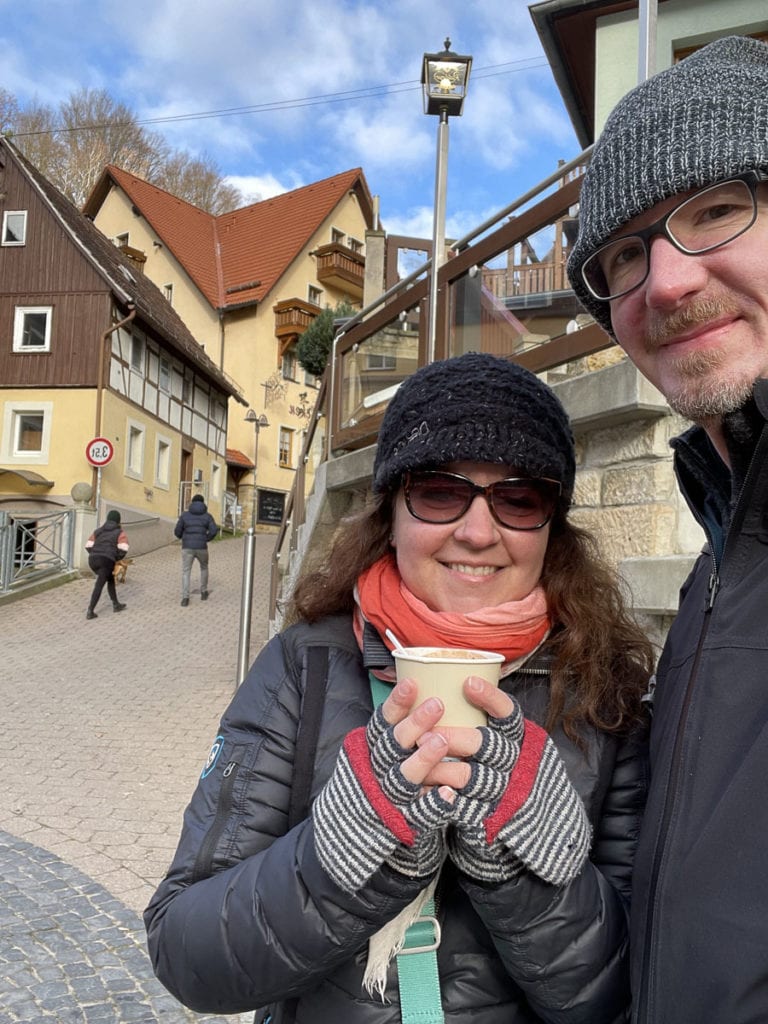
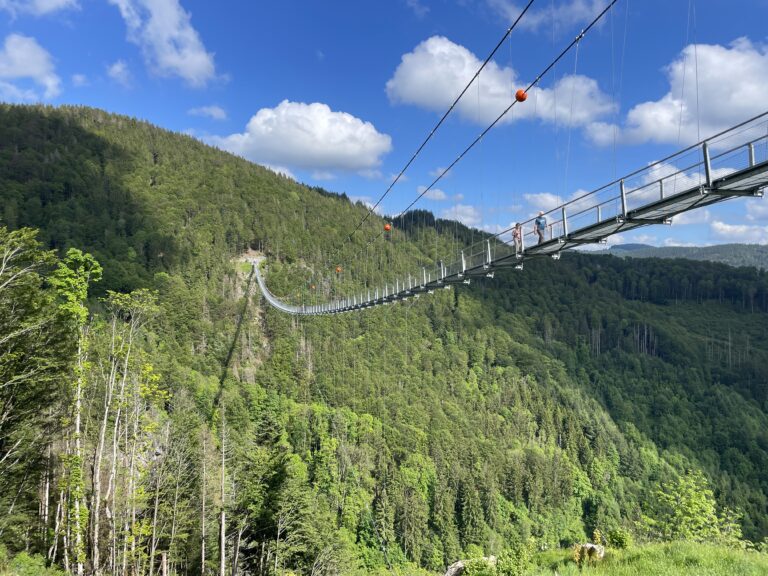
I enjoyed reading this information. My husband and I would like to stay in Germany for 2 to 3 months in 2022. I am interested in staying in the area of Bamberg with the plan of visiting other regions in Germany via a rental car. Either at the end or beginning of our stay we would like to visit France (especially Paris). I have so many questions. But our hope is to have basically our last trip on our own and experience more of the everyday lifestyle. Up to this point we have only traveled via being guest of Viking River Cruise and tours.
Hi Donna! 2-3 months in Germany sounds awesome! Since you’ll be there so long, you might want to consider spending 1 month in 3 different regions or 1.5 months in 2 regions. Otherwise you’ll be doing a lot of overnight or multi-night trips if you want to see other regions. Are you thinking about renting an AirBnB? If you want to experience the everyday lifestyle, I highly recommend it. Feel free to email me if you have questions as you start planning. 🙂
Hi! Thank you for this awesome post. It’s very useful. I wanted to ask you a question. I’m planning to travel to Germany as soon as the pandemic starts to be less dangerous. I want to go to Germany for 2 months, how many cities do you think is possible to visit? And also how much money do you think is possible to use everyday for food if my budget is small?
Thank you very much!
Hello! Two months is a good amount of time to visit Germany, and you should be able to see and do quite a lot! Just how many cities depends on how quickly you like to travel and what you want to do in each place (e.g., just see the highlights or live like a local). If you want to stick to big cities you could spend 1-3 weeks in each and take lots of day trips to see the surrounding area.
If that’s the case, you could rent an Airbnb (or similar), which would not only save you money on lodging (they’ll often give discounts for stays of 1 week or longer) but also make it easier to make some inexpensive meals at the Airbnb (and it’s easy to make German dishes “at home”!) and maybe even do laundry for free.
If you want to be on the go the whole time, moving from city to city (big, medium, and small), it will be more expensive unless you stay at hostels (or super cheap hotels). And remember to factor in the constant packing and unpacking, time getting to/from the train station (or airport)…that gets tiring when traveling for a couple months!
I recommend coming up with a budget, then looking at what kind of lodging fits that budget (hotels, hostels, longer Airbnb stays, Couchsurfing, etc). Then think about what you most want to do in Germany (live like a local, just spontaneously explore, see specific sights, have specific experiences, etc) and what you want your daily experience to be like (e.g., do you want to feel relaxed each day and get to know fewer places or be on the go, packing and unpacking, moving from place to place). Neither is better than the other, it’s just important to get clear on what kind of experience you want!
A few ways to reduce your budget:
– Eat in fewer sit-down restaurants. Eat breakfast at “home”, buy snacks and drinks at the grocery store and bring them with you each day, cook some meals each week at “home”, pick up lunch from a grocery store or bakery and eat in a park, etc. Make eating dinner in a sit-down restaurant a special occasion. Doing these things will save you money and you’ll eat healthier!
– Take busses or slower trains to travel around Germany. There are regional train passes you can purchase that allow travel in a specific area very inexpensively. Travel will be slower and there are some restrictions on when you travel (often not during rush hour) but you’ll save money and often you’ll see some out of the way sights. You can also get good deals on flights but once you factor in travel to the airport (time and cost), time to check in, waiting to board, potential delays, and then getting from the airport to your final destination, it’s often just easier to take the train.
– Buy standard train tickets in advance. You can get nice discounts on faster train tickets if you book far enough in advance.
This might be more info than you wanted but I hope that helps you start planning your trip! Let me know if you have any other questions. 🙂
Great post full of detailed information on all aspects of travel in Germany. When travel reopens in Europe we’re planning on a 2 week trip in Germany with our adult son. He’s an avid soccer fan so we’ll need to plan the trip around the soccer schedule so he can see as many games as possible. We are considering Eastern Germany with a short trip into Poland or Northern Germany with a few days in Denmark. We’d really appreciate your expertise and suggestions. Although we’ve traveled extensively in many western and eastern European countries, we have not spent a great deal of time in Germany. Thanks. J.
Hello! I’m back working on this site now and am happy to help. I’ve got more articles and resources coming but let me know if you have any specific questions!
Hi Both
The Ueckermann family 9-10 adults and 2 little once to experience Germany in Oct 2023. Central G and Netherlands will be awesome. We need to do all planning and funds estimates please assist. We live in South Africa and hopefully COVID 19 not a factor any more. Plan 2-3 weeks depending on the funds regards Engela
Hi Engela! Let me know if you have any specific questions about planning your trip to Germany. Happy to help!
HI,
I was having trouble with your email 🙂 so sorry I am just replying here. I was hoping you could help us and I wasn’t sure if you offer buying tickets and guidance of our specific places we would like to visit.
Anxiously wanting to hear back from you,
Anne
Hi Anne! I just sent you an email. 🙂
Hello Cate!
Such a well written article with great info! My husband and myself would like to travel to Germany in Oct. of 2022, possibly with my then 16 year old son as well. We want to go in October so we can also experience Octoberfest. I cant have beer because I have celiac’s. IS THERE OTHER ALCOHOL DURING OCTOBERFEST OTHER THAN BEER? WHAT IS THE WEATHER IN OCTOBER AND DOES OCTOBERFEST RUN THE FULL MONTH? IS THERE A CERTAIN AREA WE SHOULD STAY TO REALLY EXPERIENCE OCTOBERFEST AND ANY POTENTIAL ISSUES TO AVOID DURING OCTOBERFEST? We are overwhelmed with planning our trip because we don’t even travel within the US and I feel like there’s so much we want to experience in such a short period. We would like to go for 2 weeks. We want to go because both our families are from Germany. My family comes from Nuremburg (sp) and my husbands family Bavaria but we are unsure which part. This trip is important for us to try to learn about our family roots. DO YOU KNOW WHERE WE COULD GO IN GERMANY TO LEARN ABOUT OUR GENEOLOGY? We would like a more of a laid back approach to experiencing Germany. I dont want to necessarily feel rushed every single day but I do understand that some events and places we would want to visit would need to be scheduled and we are ok with that. I would like to do the Air bnb but know nothing about them. I would like less stress worrying about transportation such as missing busses. We are interested in castles, picturesque views, experiencing floating on the Rhine River perhaps. ANY SUGGESTIONS ON AIR BNB’S THAT PROVIDE BREAKFAST AND ANY IDEAS ON AREA’S TO VISIT BASED ON EVERYTHING I’VE PROVIDED? P.S……our last name literally translates to “the German”. We have had so many Europeans tell us that when they hear our name…LOL
CORRECTION: This is Lisa Nemec. My hubands family is Bohemian. We believe his family crossed over from Czech.
Hi Lisa! There are plenty of other drinks at Oktoberfest, both alcoholic and non-alcoholic, so you shouldn’t have any trouble finding something. The weather at that time of year can vary but in late September to early October it’ll likely be warm during the day and cooler in the evening. Oktoberfest is mostly held in late September but I believe it goes until Oct 2 in 2022. There are a lot of hotels and AirBnB’s within walking distance of Oktoberfest (also walking distance to downtown) but book early because they fill up quickly! You’ll also pay a premium at that time of year. Some people prefer not to stay near the main train station but other people don’t mind it.
As to where you could go in Germany to find out about your genealogy, I’d start by searching the genealogy sites online and get as much specific info as you can. You can then try a site like https://www.genealogienetz.de/index_en.html (I haven’t used it, just found it).
If you have 2 weeks, you could fly in and out of Munich and focus on Bavaria. While in Munich you could take a couple day trips to Salzburg, Berchtesgaden, Neuschwanstein, the Alps, etc. You could see a lot at a laid-back pace in 2 weeks!
AirBnB’s are great if you’re going to be somewhere for at least a few days, want a little extra space, a kitchen, etc. Even just being able to make breakfast, coffee/tea, and keep drinks cold for when you come home in the evening is so nice. But you don’t typically get hotel-like services like a prepared breakfast, new towels each day or linen changes. If you want to be walking distance to lots of things in Munich, a hotel near downtown could be a great option. If you’re ok with being in a neighborhood, an AirBnB could be a good choice. There are so many great neighborhoods in Munich so you really just need to look at price, amenities, and distance to the things you want to see. I’ve stayed at hotels near Marienplatz and in an AirBnB further away (maybe a 10-15 minute walk + U-bahn ride to Marienplazt) and I enjoyed both.
I hope that helps!
HELP……I have been put in charge of coming up with an itinerary for my hubby and 4 of our friends for travel in July 2022. I truly have no idea what I am doing. What we are looking for are castles, beautiful scenery and history (although I have been told that they do not want to go to concentration camps). The following is the tentative itinerary I have come up with. We are looking also, for moderate priced Inns/quaint hotels and castle stays centrally located. Any changes/suggestions/comments would be GREATLY appreciated.
We will be renting 2 cars.
1 night Munich drive to Nuremburg
3 nights Nuremburg – drive to Fussen
1 night Fussen – drive to Ettal
3 nights Ettal – drive to Unterwossen
1 night Unterwossen – drive to Salzburg Austria
3 nights Salzburg Austria drive to Munich
1 night Munich – fly home
Hi Linda! Your itinerary looks good for a 2-week trip. Here are few suggestions:
-If you’re flying into Munich, you could drive right to Nuremburg on the first day, since it’s only a couple hours drive from Munich airport. If you pick up your car, drive into Munich, settle into a hotel, and then drive to Nuremburg the next day, you’re using a lot of time for driving/checking in/unpacking/packing and you won’t get to see much of Munich. If you go right to Nuremburg on arrival day and stay for 3 nights, you could add a night to the end of your trip so you have 2 nights in Munich or add a day to Salzburg and keep Munich at 1 night.
-Fussen and Ettal are pretty close to each other so you could stay 3-4 nights in one and then take a day trip to the other. I like to reduce the number of one night stays as much as I can during 1 and 2 week trips for the reasons I mentioned above. You could also stay in Ettal and make day trips to both Fussen and Unterwossen and cut out 2 1-night stays.
-If you don’t want to see Munich, I’d keep that at 1 night and stay near the airport at the end of your trip. If you do want to see Munich, I’d give that 2 nights minimum.
I hope that helps! I think you’ll really enjoy your itinerary!
Thankyou for all the wonderful suggestions! I’m visiting Germany closer to Christmas for two weeks.
That’s my favorite time to be in Germany! Everything is so beautiful and festive. You might be interested in my Stuttgart Christmas Market article – even if you won’t be near Stuttgart, it will give you an idea of what you can do, see, and eat at any Christmas market. I also talk about 6 other nearby Christmas markets that are super fun to visit. 🙂 Enjoy your trip!!
I had all but given up on our delayed 25 yr Wedding Anniversary(07/28/2020 delayed to Sept 2021, due to covid) trip to Germany. Then I found your website! It reinvigorated our desire to NOT CANCEL our plans!
We have a son in Kaiserslautern(rhein main air force base) , and want to split a 2 week trip between seeing 7-8 days traveling in Germany( Berlin, Munich, Cologne, and Stuttgart) and Paris. And then 6 to 7 day visiting our son.
We had all but given up, until I read your article. Thanks! I wish that there were some way to have everything planned for us in advance! But, your post at least has assured us that we can make this happen on our own. Thank you very much!!
Definitely don’t cancel your plans, even if you have to postpone! (We had to postpone our anniversary trip, too – such a bummer!) You can definitely make your trip to Germany happen. Here are a few ideas for you…
You could fly into Paris, then travel to Kaiserslautern to see your son and do a day trip to Stuttgart (visit the Christmas market if you’re there in December or nearby Esslingen any time of year) and then either visit Munich and the area around there (fly out of Munich) or travel up to Cologne and over to Berlin (fly out of Berlin).
It’ll be a lot to try to see Paris, spend several days in Kaiserslautern, and also see Cologne, Stuttgart, Munich, and Berlin but if you can combine things – like if your son can go with you to visit Stuttgart and Munich or Cologne and Berlin, you could see a lot of the places you’re interested in. Flying into one city and out of another will help a lot, too.
You could also fly into Munich, then go to Kaiserslautern via Stuttgart, take a short trip to Paris, then go to Berlin via Cologne and fly out of Berlin. Or do the same but start in Berlin and fly out of Munich.
You’ll have a great time no matter your itinerary! 🙂
Hi Cate
Your website is a such a great resource! I have a ton of questions about planning a trip, I’m just going to send you an email.
Thank you
Komal
Got it and replied 🙂
Hello,
We’re planning a trip to Germany at the end of February next year. What is the weather typically like during that time? Our itinerary includes arriving in Frankfurt, spending a day in Cologne, then heading to the Black Forest for about three days, followed by three days in Zurich, and returning to Frankfurt for three more days. Do you think this plan is good, or would you suggest any changes? Additionally, what places would you recommend visiting? Lastly, do you think purchasing a Eurail Global Pass is worthwhile for this trip?
Thank you!
Hi Sarah!
The weather will likely still be cold in February but you could have some sunny days. Rain (or even snow) is always a possibility so bring an umbrella or even a waterproof jacket or shoes.
To best answer your other questions, I recommend booking either an itinerary review or a one-on-one consult in Zoom. I’ve helped hundreds of clients answer questions just like yours. 🙂 You can check out both options and read what previous clients have said here: https://www.mygermanyvacation.com/services/
I’d love to help you get your trip sorted so you have the best trip to Germany ever!
What is a good budget for 2 adults in Germany for two weeks?
It’s nearly impossible to give a guideline because it depends on so many things – your travel style, what kind of transportation you want to use, your accommodation & restaurant preferences, etc. I know that’s not very helpful in the short-term but it would be less helpful for me to give you a specific budget not knowing any specifics about you or your trip plans. Plus, most travelers like to splurge in one area and cut back in another but that’s so different for each traveler.
What I recommend is this: start looking at flights, transportation, and accommodations well before you want to book them in order to get an idea of what each costs for your travel dates. Add everything up for 2 weeks and then decide if you’re ok with that amount so far, keeping in mind you’ll still need to add on food, souvenirs, tickets/tours, insurance, and anything you need to get before you leave (clothes, luggage, passport, etc). I like to do this research before I book flights/transport/accommodations. That way I get an idea of what will be my splurge and where I will need to reduce costs to keep within the budget that’s right for me. Everyone’s ideal budget is so different!
hi
i am planning to travail to Germany in December 2021 with my family , any idea
My big tip for Germany in December: visit the Christmas markets (if they’re open this year)! You’ll find one in nearly every German city, town and even small villages. They’re outdoors so dress warmly and enjoy the food, drink, and stalls. They’re a great place to pick up souvenirs and gifts, too.
Days are short in December, and some touristy sites do shut down in winter, so keep that in mind. But you’ll still find plenty to do after dark, especially if you’re in bigger cities. As long as you take these two things into consideration, you’ll have a great visit no matter where you go!
Hi, my partner and I are wanting to visit Germany in January 2022. I have previously stayed in Wurzburg for 3 weeks and dream of taking my partner there.Seeing as I went with school a few years ago we didn’t really have a chance to look around other parts of local Germany. Where would you recommend us to go whilst in that area? We like architecture (but not too much…) we’re in our 20’s so we also want to have fun 🙂 we’ll either be driving (we live in France) or we’ll be going by train.
Will the Christmas markets still be on? I doubt it but you never know…
Thanks
Also, we are wanting to go with our dog. Would that be possible or too complicated?
You could easily go to Munich and spend a few days there – lots to see and lots of places to have fun. (I had a great time there in my 20s!) There are also a lot of day trip options – Berchtesgaden, Salzburg, Neuschwanstein, Passau, Regensburg, etc. You could also stop in Nuremberg on your way to Munich. All of that is easy by car or by train – and if you go by train, you could probably do those day trips using a regional train pass. Or you could do guided day trips and not have to plan anything! I’ve got some listed in my Munich guide – https://www.mygermanyvacation.com/munich-travel-guide/
It looks like the Christmas markets are on for 2021 but they could always get canceled in the coming weeks. Most have their last day on Dec. 24 so unfortunately, you won’t get to see them if you visit in January. That just means planning another trip to Germany for December 2022! 🙂
Germany is pretty dog-friendly so it’s probably do-able. But there are likely museums and other sites that might not allow dogs inside. If you mostly want to spend time outdoors, and your dog is ok with possibly very cold/wet/windy weather, or if you can leave the dog at your lodging for part of the day, it might work ok.
Hope that helps!
Hi Cate, you have put together a terrific planning guide. Thanks. Our 4 children just gave us a trip back to Germany in celebration of our 50th wedding anniversary. We lived in Erlangen from Aug 1972 – 1973. We are excited to go back but we are debating between a Rhine river cruise or going on our own. We’ll probably go sometime in May/June or Sept/Oct 2022.
How exciting!! It’s so fun to go back and revisit where you used to live in Germany. Aaron and I did that in 2019 and had such a good time seeing what had/had not changed. I’m excited for you!
I’ve heard people say great things about Rhine river cruises. If you don’t have time to or don’t want to do much trip planning, that’s a great option. The downside is that you’re more limited to what you can do and see. If you have time and interest in planning your own trip, you can definitely do it. And since travel is coming back, I’ll be focusing on this site a lot more in the coming months and helping people plan their trips, so I’ll be here to help you, too. 🙂
Hi Cate, We have wanted to visit Germany (from the US) for a few years now and have finally decided to make it happen, but had no idea where or how to start. Your article is full of valuable information. Thank you. At least we now have a starting point. Our trip isn’t for another year, but it will go quickly. So excited and thank you for all the information.
You’re welcome! I’m so excited for you already. 🙂 The next year will fly by and you’ll be on a plane bound for Germany before you know it. Now that travel is coming back, I’ll be focusing on this site a lot more so be sure to come back when you’re ready to plan your trip. I’m working on lots of guides and helpful resources! 🙂
Hello. My grandfather expressed interest in going to Germany in 2022. More specifically, he wants to go to ‘The Battle of the Bulge’ where his older brother passed away in World War II. We would also like to go to the Holocaust Memorial. I have been trying to research/plan this trip but would be open to suggestions. We are from the US and could spend about a week out there. I am grateful that I stumbled across your blog as it is very informative and interesting! 🙂
Hello! That sounds like it will be a wonderful trip for your grandfather! If you’re talking about visiting the Holocaust Memorial in Berlin (highly recommended), you could fly right into Berlin (their new airport!) and spend half of your time seeing the city, then head to Brussels and take a Battle of the Bulge day tour! I found one here that you can look at (aff link): https://www.getyourguide.com/bastogne-war-museum-l35043/bastogne-battle-of-the-bulge-tour-from-brussels-t169657/?partner_id_Y5UOFLS It looks like it also goes into Luxembourg so you could get 3 countries in one trip. 🙂 If you have enough time, you could take a day trip to Brugges or Ghent – both are 30-60 minutes from Brussels. You could then fly out of Brussels back to the US. To get from Berlin to Brussels you’d probably want to fly but it’s a short flight and you could probably get an early morning or a late afternoon flight so it wouldn’t take up your whole day. Hope that helps with your planning!
Hi, your site is wonderful and has some great information! I am traveling (solo) to Germany in late April and will be there for one month. I have been to Munich/Bavaria/Salzburg before so I’d planned on focusing my trip on the rest of Germany. I’m flying into Berlin and was planning on staying there 4-5 nights, then I’m not sure where to go. I was thinking of spending a week in an area and going on day trips; for example, the Black Forest, the middle Rhine area, maybe Harz Mountain. But I also want to see some cities like Cologne, Frankfurt, Heidelberg, Trier, and Hamburg. So maybe a bit of both cities and countryside? Do you have any thoughts? Thanks!
I definitely recommend choosing 3-4 locations where you can stay for a week or so and then take day trips. You could do longer stays in Berlin and Hamburg – there’s tons to do and see in each city, as well as lots of day trip options. You could also do Cologne or try a smaller town on the Rhein or Mosel and explore that area in more depth. For the Black Forest you could stay in the university town of Freiburg and day trip to towns/hiking in the Black Forest, as well as Basel and Colmar/Strassbourg). You could also choose 3 locations for longer stays (e.g., Berlin, Hamburg and Freiburg) and then do a couple of 2 or 3-night stays as you travel between cities, e.g., a short stay in Wernigerode or Quedlinburg (Harz mountains), Trier, Heidelberg, Stuttgart, or Tübingen on your way to Freiburg. Tip: if you want to do a lot of day trips, make sure you stay where it’s fairly quick and easy to get to the train/bus station! Since you’ll be there for a month you have lots of flexibility and plenty of time to do and see a lot of the areas you mentioned!
@Cate, Thank you so much! I’m really enjoying going through your site, too!
Looking for a good travel guide book for Germany any recommendations?
Rick Steve’s is always a good one! I’ve used his guidebooks a ton. You can get his Germany guidebook on Kindle or as a hard copy (aff link): https://amzn.to/33z7d59
@Cate, Thanks
So excited to find your site! My husband and I will travel from Texas to Bavaria for 7-10 days in September. I am in charge of all the planning.
I’m thinking Munich & surrounding area and Salzburg. Do you have any suggestions? I’m also pondering some organized day tours..
Munich is a wonderful home base for seeing lots of great sites in Bavaria! You could easily spend 1-3 days in Munich (especially if you’re there during Oktoberfest) and then take day trips to places like Neuschwanstein, Garmisch-Partenkirchen, Salzburg, Linderhof, Chiemsee, Berchtesgaden, Nuremberg…just to name a few! You can easily do all of that by train and mix it up with some organized day tours here and there. I’ve been working on a Munich guide that will have ideas for day trips and tours so keep an eye out for that!
Hello Cate,
Your blog is very helpful. Like to seek your help and guidance. I am from Singapore and not familiar with Germany. Both me and my wife intend to fly to Amsterdam where my daughter is attending university and spend 18 days vacation with her in Europe during her break. Am planning 7 days touring Germany. Tentatively looking tourist site at hamburg, Berlin, Stuttgart and then off to another country eg. france, switzerland or Italy for another 7 days. then travel back to Amsterdam to fly home. Any advise how we can optimize the traveling as we are not familiar with these region? Appreciate your kind assistance.
regards,
Perry
It will be so much fun to travel with your daughter! It might be difficult to fit Hamburg, Berlin and Stuttgart into 7 days. On the train it takes about 6 hours from Amsterdam to Hamburg, 3 hours from Hamburg to Berlin, and over 8 hours from Berlin to Stuttgart. While all three of those cities are amazing, I recommend choosing either northern or southwestern Germany, rather than trying to hit all three (or make the Germany part of your trip 10 days).
You could, for example, travel from Amsterdam to Hamburg, then to Berlin, and fly from Berlin to France or Italy. That would give you plenty of time for travel, city exploring and day trips.
Or take the train from Amsterdam to Stuttgart and explore that area. Stuttgart is close to France, so you could spend several days seeing both southwestern Germany (Stuttgart, villages in the Black Forest, Freiburg, Baden-Baden, etc) and French cities like Strassbourg, Colmar and Mullouse. You could also very easily go to Basel in Switzerland! It’s a long train ride from Amsterdam to Stuttgart so I’d look into flights. Stuttgart is a great airport to fly into!
I hope that helps!
Hi, my family and I would like to visit Germany this summer. My husband and I have two teenagers (15 and 13), and one of them is reads a lot and it is very interested in history. We would like to visit german cities but also, some concentration camps. Our plans is to spend two weeks there. Any suggestions?
You’re going to have so much fun in Germany! Everywhere you go there’s so much history, so it just depends on what kind of history you’re looking for. For a 2-week stay you could easily visit 2 (maybe 3) different parts of Germany without feeling like you’re spending your whole vacation on the train or in the car. You could, for example, fly into Munich, visit the city and Dachau concentration camp, take a few day trips to Salzburg, the Alps, Neuschwanstein, Nuremburg, etc – there are so many options!…then visit the Black Forest area, the Rhein/Mosel area, the Hamburg area or the Berlin area and fly out of that second city (Stuttgart, Cologne/Düsseldorf, Hamburg or Berlin). If you want to focus on 2 main areas, say Munich and Berlin, you could do a 1-2 night stopover in a city in-between. Hope that helps you get started on your planning! 🙂
@Cate, We are from USA planning on attending next years NfL game if possible. We are a large group 10-15people who would also like to see the culture and history. Open to staying in Berlin, munich, or anywhere else as long as accessible to get to game. We want to fly out wed night from BOS be there Th F S Su (game in Frankfurt) leave M. Anything you would recommend?
Hi! I just now saw your question. If you’re flying into FRA and have Th, F, and S to do some sight-seeing, I’d stick to the Frankfurt area and do day trips. If you go to Berlin or Munich you’ll spend most of your time in transit and checking in/out of hotels. We’ve got a Frankfurt guide on our website and also a castles guide – so you could spend a day exploring FRA, then a day visiting a castle, and then 1 day visiting a nearby city like Heidelberg, Nürnberg or Rothernburg ob der Tauber. Hope that helps! Let me know if you have any other questions. We’ve also got a Germany Trip Planner and one-on-one travel consults, too. And lots of info on this website. We’re happy to help!
I just found your great website! We have just drafted a 3 week trip plan to Germany and Austria and I would love your thoughts about it!. Is late May better than June? (I really can’t do heat without AC!)
– [ ] 2. Land in Vienna- 2 nights…
– [ ] 3. Take tour or just Spend a day in the sprawling Schönbrunn Palace,
– [x] 4. Rental car to Take KM 29 for about an hour to Burg Liechtenstein drive an hour to Melk Abbey Then Steyr From Melk, Steyr 1 night stay
– [x] 5. Spend a little time, touring the Steyr Mannlicher!
– [x] 6. Wake up early and bike 15 minutes to spend the morning exploring more of Halstatt before the day-trippers.. Sky Walk salt mine
– [x] 7. After lunch, enjoy more the beauty of Salzkammergut area! on to Salzburg in time to return the rental car. we will stay in the old town (Salzburg 3 nights)
– [ ] 8. See Salzburg
– [ ] 9. Take guided tour to Eagles nest
– [ ] 10: To Munich by 2 hour train.. taxi to hotel, Sleep Munich 2 nights …
– [ ] 11. Guided tour all day— Dachau and Munich sites
– [x] 12 Slow morning to rest, checkout, cab, 1.5 hour train to Oberarmagau for lunch and stroll. Rent car in Garmish and Drive another hour to Sleep in Hohenschwangau 2 nights Maybe take 30 minute Schloss Hornschwangau Castle tour before closing if time
– [x] 13 Visit Neuschwanstein! (Hohenschwangau castle first if not last evening) then rent a bike and go a mile -7 minutes to Tegelberg luge ride
– [x] 14 drive 2.5-4 hours but first stop for lunch and see Ulm Cathedral. Going Opposite the crowds arrive in afternoon to stay in nearby Rothenburg 3 nights. See stunning Rothenburg
– [x] 15 After coffee and quiet streets, walk the medieval wall. If crowds arrive, leave and drive a short way and tour the Bad Weinsheim Frankonian Open Air Museum
– [x] 16 Drive 30 min to Ansbach, park and Take 30 min train and10 min cab into Neuremburgfor day.
– [x] 17. leave in early morning and drive 3-5 hours through To St Goar take B9 along the Rhine from Bingen arrive in time to tour Burg Eltz and then maybe return car in Emmelshausen this day or next. Take cab back down to nearby St Goar for 3 nights.
– [ ] 18 See Burg Eltz castle if not seen yesterday and then see Marksburg castle
– [ ] 19 REST maybe just board a boat for a relaxing Rhine River cruise from Sant Goar. We will disembark to visit small Bacharach and back again by train.
– [ ] 20 Depart by 70minute train to Frankfurt airport
Or would it be better to do the trip in reverse, starting with Germany first? Thank you!!
It’s not usually super hot in May but it can be hot in mid-late June. The last time we were there in June (2019) it was incredibly hot and there isn’t as much a/c there…but you never know, I’ve had cold and rainy June visits, too. If you want to be more sure of not-super-hot weather, I’d go in mid-late May or early to mid-June — as long as you’re ok with the possibility of some not-so-warm days. If you go in mid-late June and don’t love hot weather, book hotels with a/c, rent a car with a/c, and plan to buy a lot of cold drinks. No matter the weather, it’s always fun to travel around Germany! 🙂
You could easily do your itinerary either way so I’d just look at whether flights are better into Vienna/out of FRA or vice-versa. Check the hotels you want to stay in to make sure they have availability — I’ve actually reversed my itinerary before due to hotel availability!
You’re planning to cover a lot of ground in 3 weeks and be on the go go go, which some people find more tiring than expected…but if you know your travel style, then go for it! 🙂 3 nights in one place gives you 2 full days, which is a good amount of time for most places. 2 nights means 1 full day, which can be enough in some locations but if you do many in a row, it can feel like you’re constantly checking in/unpacking/packing/checking out, and can get super tiring if you’re doing a lot of day trips.
Be sure to plan in time for getting ready, eating breakfast, packing, checking out of the hotel, getting to the train station/car rental – it often takes up more time than you’d expect. Trains aren’t as punctual as they used to be, so keep that in mind for what you plan on arrival after a train trip.
An idea — instead of taking a train to Oberammergau, then to Garmisch to rent a car, then driving to Hohenschwangau, I’d rent a car in Munich and drive to each place. It will probably be less expensive to rent in Munich and easier than doing the train and car pick-up (especially with luggage!).
For the longer drives, plan on them taking longer than what’s estimated in google maps because there’s often traffic! If you miss the traffic and arrive early, it’ll be a nice bonus!
Your idea to add in some guided day tours is a good one – it’s a nice change from having to figure everything out yourself and can feel like a mini vacation from your vacation.
Overall, you’ve got a really fun trip planned!
Hi Cate! I love your clear way of describing and explaining. My husband and I are invited to a wedding outside of Berlin the last weekend in April. From there we would love to head to the spas in Baden-Baden .. what else would you suggest to see in the Baden-Baden area and without driving the best transportation option? We can stay up to about 10 days. Thank you!
Thank you for your nice comment! 🙂 I’d take the train from Berlin to Baden-Baden. It’s about 6 hours and you can relax and see the sights along the way. You could fly from Berlin to Stuttgart but by the time you travel to the airport in Berlin (the new one is further out than Tegel was), check in, wait to board, fly, and then take the train from Stuttgart to Baden-Baden, it’s at least as long as – if not longer – then taking the train.
When in Baden-Baden you could visit Gengenbach, the Black Forest, Triberg (cuckoo clocks & waterfalls), Tübingen, Stuttgart/Esslingen, Lichtenstein Castle, Hohenzollern Castle, Freiburg, Basel (Switzerland), Strassbourg (France), Colmar (France) — just to name a few! You should be able to reach all of these places via train/bus. The Black Forest Open Air Museum is also a lot of fun! I’m working on guides to several of these locations – and some are already on the site – so check back soon for new ones. 🙂
You should be able to get a free KONUS train pass, which enables you to travel throughout the Black Forest region for free. I don’t think it works for every place I listed but it will get you to several of them. Here’s more info about the KONUS card: https://www.schwarzwald-tourismus.info/planen-buchen/konus-gaestekarte (you can switch to English if it’s in German).
You could fly out of Stuttgart airport or travel up to Frankfurt and fly out of there. Strassbourg or Basel might work, too.
Hope that helps!
@Cate, that really does! Thanks again,
You’re very welcome!
I am planning a trip with my husband, 18 year old daughter, mother in law and myself. We will have 8 nights total flying Munich to Amsterdam or vice versa. Interested in the Christmas markets, of course, castles (would love if we could stay the night in a castle if that’s possible), and just getting an authentic German experience. My mother in law found family ancestry in Stuttgart, so she would like to stop there. The other areas that we have an interest in are Frankfurt, Cologne (wonder if there is such thing as a day cruise on the Rhine River), and maybe Hamburg (for the canals, but I’m not sure December is the best time of year for that). Although, I’m not sure we’ll be able to see all those cities in just 8 nights, as we would also like 1-2 nights in Amsterdam.
We plan to rent a car and I will be doing the driving. We live in Colorado so I’m familiar with winter driving, but wonder if I can use Google maps while traveling through Germany.
Would love your thoughts or suggestions on this.
Thank you,
Lea Ann
Hi Lea Ann, you’ve got the makings of a magical winter trip! All of the places you mentioned will be beautiful in December because of the Christmas markets. Stuttgart, for example, has a huge, old Christmas market (plus there are 2 other really beautiful ones nearby) and there are 2 nearby castles you can visit. Hamburg and Cologne and also wonderful cities (Frankfurt too but I’d skip it on a short trip unless you have a specific reason to go there).Amsterdam is also a lot of fun and a great place to fly in or out of.
It’s a lot to fit into 8 nights so you’ll definitely need to hone in on just a few places, otherwise you’ll spend your entire trip packing/unpacking/driving. 🙂
You can use google maps in Germany and that’ll make getting from place to place easy. But unless you want to stop at specific sights between cities, you could easily take the train, since you’re going to big cities (you don’t need a car in any of the cities you want to visit). If you don’t mind parking the car at each hotel in the city, a car can give you more flexibility.
You can also stay in a castle in Germany! We’ve got a guide for that right here so you can see which one you like best.
It’s hard to get more specific about an itinerary here in the comments without taking to you and getting a better sense of your interests and needs but we’ve got lots of resources to help you — Christmas market guides (definitely take a look at the Stuttgart one!), city and hotel guides, and we’ve also got a Germany Travel Planner with an interactive Germany Travel Map, City Cheatsheets, and other resources, and I do one-on-one trip planning consults.
And be sure to join our travel planning Facebook group!
@Cate, thank you for your quick response and feedback! I’ll check out the links you shared and I’ve joined your Facebook group.
You’re welcome! Glad you joined the group! 🙂
Hi Cate , I have visited Germany but only Düsseldorf for my sugery.
I will like to take my wife and kids with me this time I have an appointment in December might use the opportunity to take them for Christmas holiday . I have 12’night in total . 5 night in Düsseldorf can you please advise which city we can visit for the rest days and we are not leaving Germany until 26th. So I want them
To enjoy the Christmas but I don’t know which city to choose .I will you to please give me where the kids can enjoy the trip age 8 ,6 and 3 . Do we fly back from
Düsseldorf or from
Another city ?
Thanks for your help.
If you’d like to fly out of the Düsseldorf airport, you could spend the second part of your trip in Cologne so you could visit the markets there, in Bonn, and surrounding area (e.g. a day trip to Aachen).
If you’re ok with flying out of a different airport, you could go to Stuttgart (good Christmas markets in the area and a couple castles), Munich (good markets and day trips) or Berlin (good markets and day trips) and fly out of any of those airports.
Most everything will be closed on Dec 25 and the latter half of Dec 24 so keep that in mind when doing your daily planning.
Hope that helps with your planning!
Hi,
Thank you for the detail page. I and my family will be visiting to watch a NFL game in Frankfurt and had some travel ideas outside of the city that I have not found solutions for. First, are US citizens allowed to rent cars without a permit? We want to travel to Stuttgart and Munich for some museums and possibly Berlin, but I’ve yet to figure how time and distances for the trip as these do seem to be quite a distance from each other. Then, we would end the trip back in Frankfurt to travel back to the US, unless we find an airline in Berlin. Do you have suggestions? This would be a 7-14 day trip, depending on cost. Thank you
Hi Marco! Yes, you can rent a car with just your US driver’s license. While not required, an int’l driver’s license can be helpful if you get pulled over or in an accident (you can get on at AAA). You can check distance between those cities via google maps (it’ll show you both driving and trains). I always add 25% to the times they suggest because there’s a good chance you’ll encounter traffic somewhere. We use google maps for all of our road trips in Germany. You could definitely do Frankfurt – Stuttgart – Munich – Berlin – Frankfurt (stay near airport on the last night) in 14 days. If you don’t want to drive from Munich – Berlin – Frankfurt, you could return the car in Munich and then take the train to Berlin and back to Frankfurt. Hope that helps you get started on your trip planning!
Hi, Cate – Your website is EXTREMELY helpful! We will be traveling from the US to Germany June 14-26 (flying to Frankfurt). Staying with friends in Lake Constance for June 21-26 & using as a homebase for day trips / cycling. However, prior to this…we’re meeting up with our two teenage sons in Hattenheim, where they are currently enjoying a mini study abroad. Their host family has invited us to stay with them 2-3 nights (June 14-16). What are recommended day trips from this area (so that we may be courteous & oblige their kind invitation for lodging), and what should we “fit” in between June 17-21, after we depart Hattenheim & are en route to Lake Constance? We’re an active, adventurous family!
That will be a fun trip! You’ve got lots of options near Hattenheim – the Rhine river villages or a boat cruise, Mainz, Wiesbaden, Idstein, Limburg – all of those are great. On your way to Lake Constance, you could stop in the Black Forest! Lots of fun hikes, alpine coasters, castles, waterfalls, villages, etc – beautiful area!
Do you have our DIY Germany Travel Planner? If so, take a look at our Black Forest planning guide and our interactive map with our top recommended sights, castles, hotels, and more!